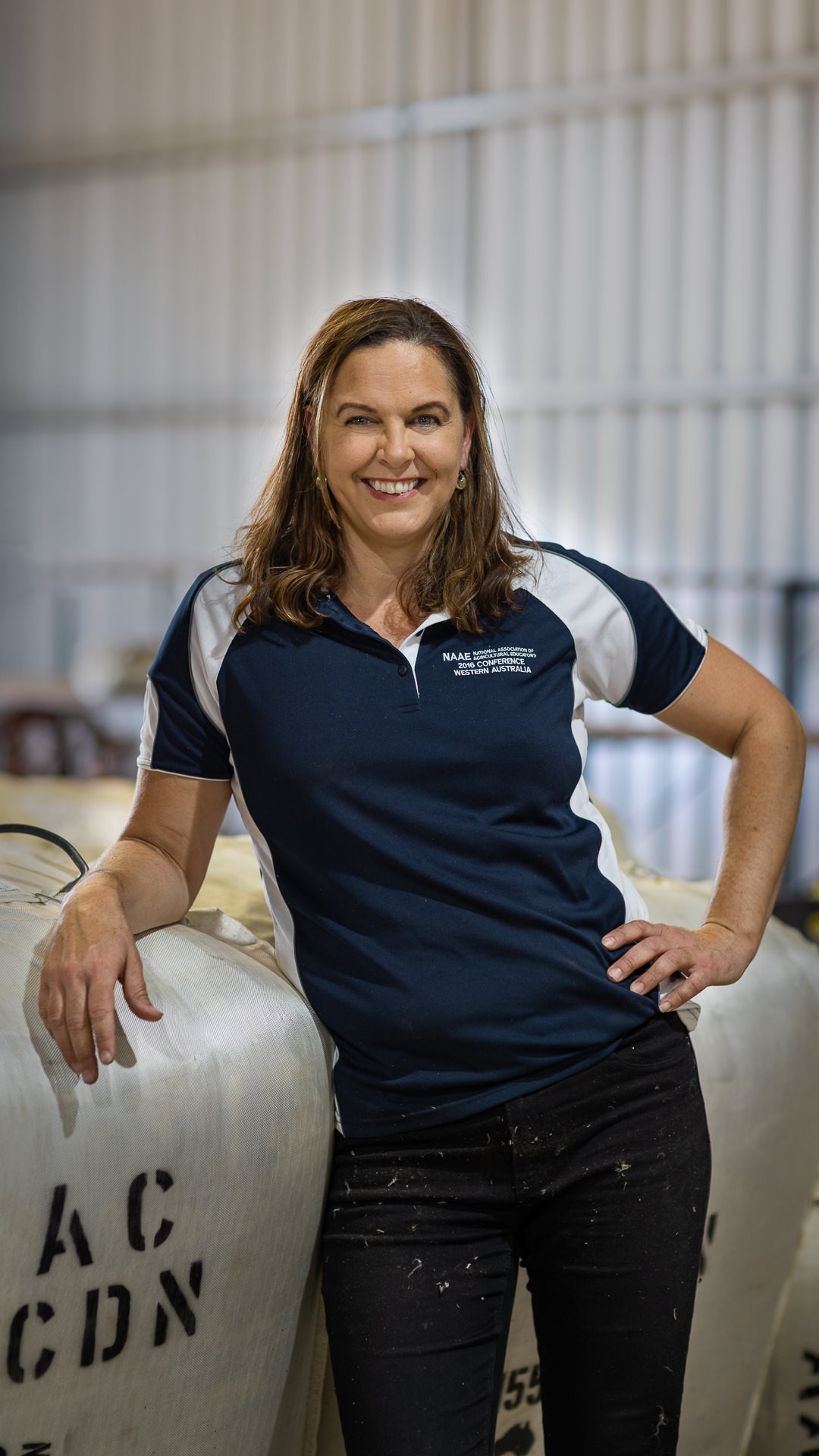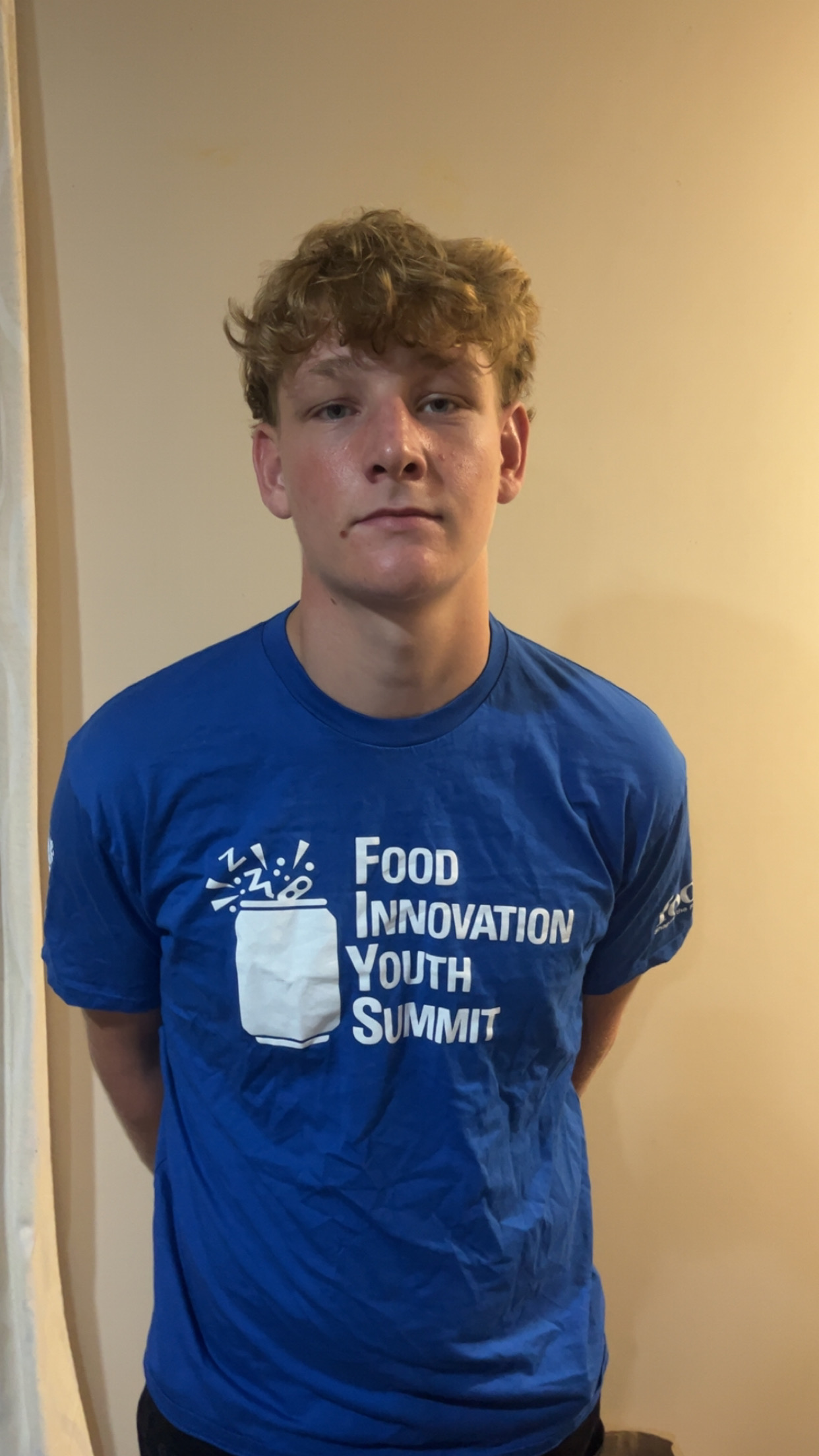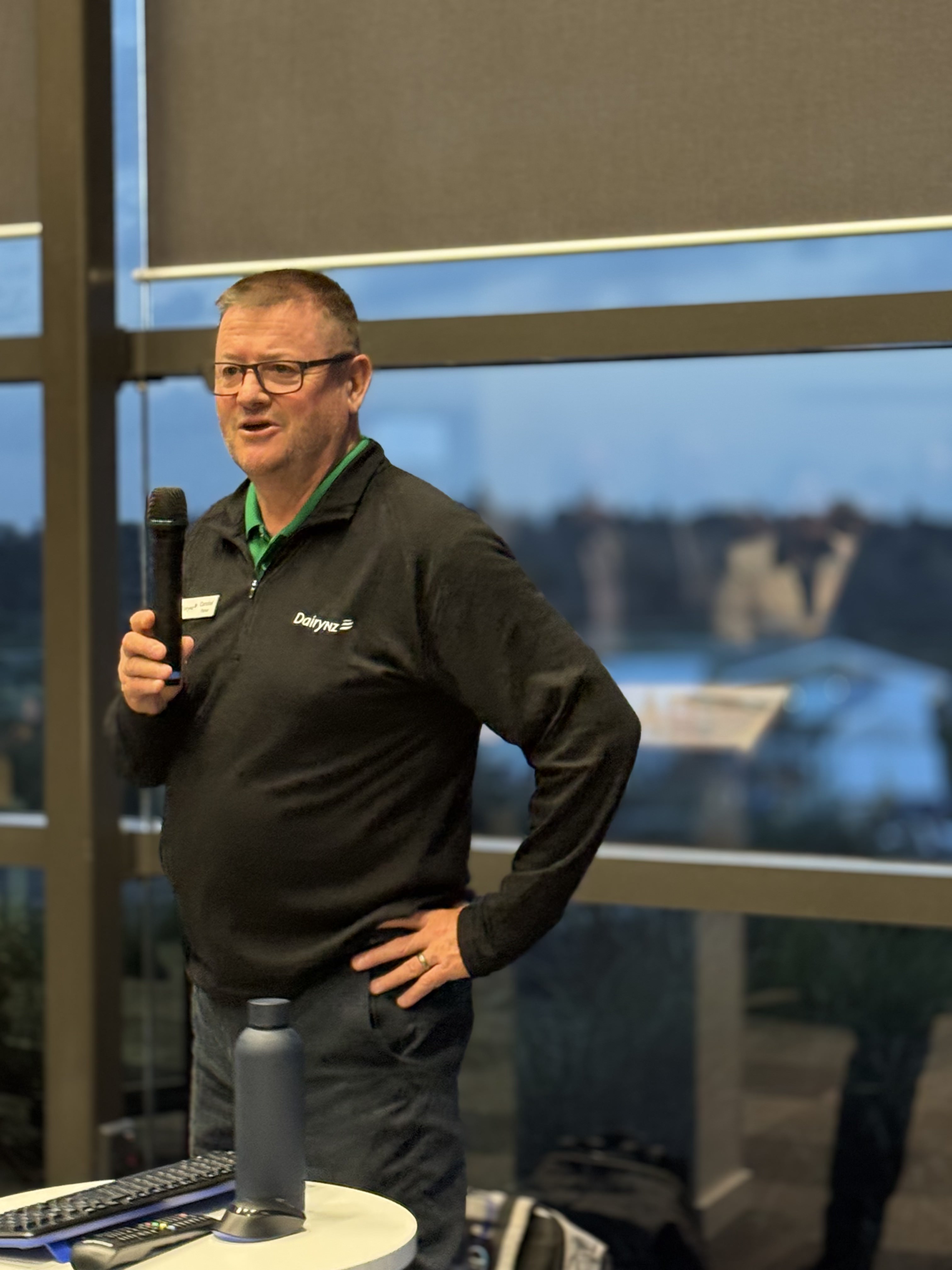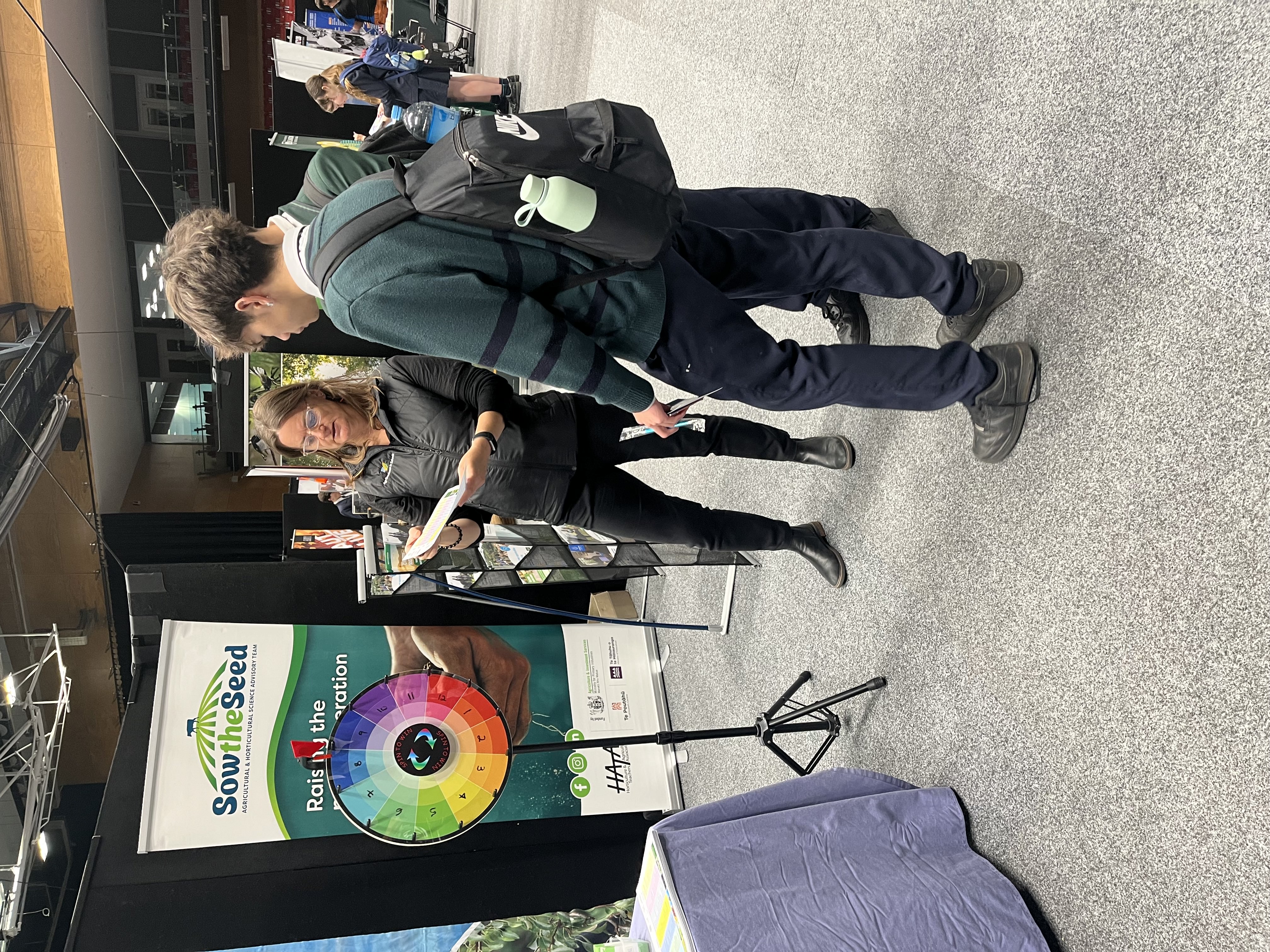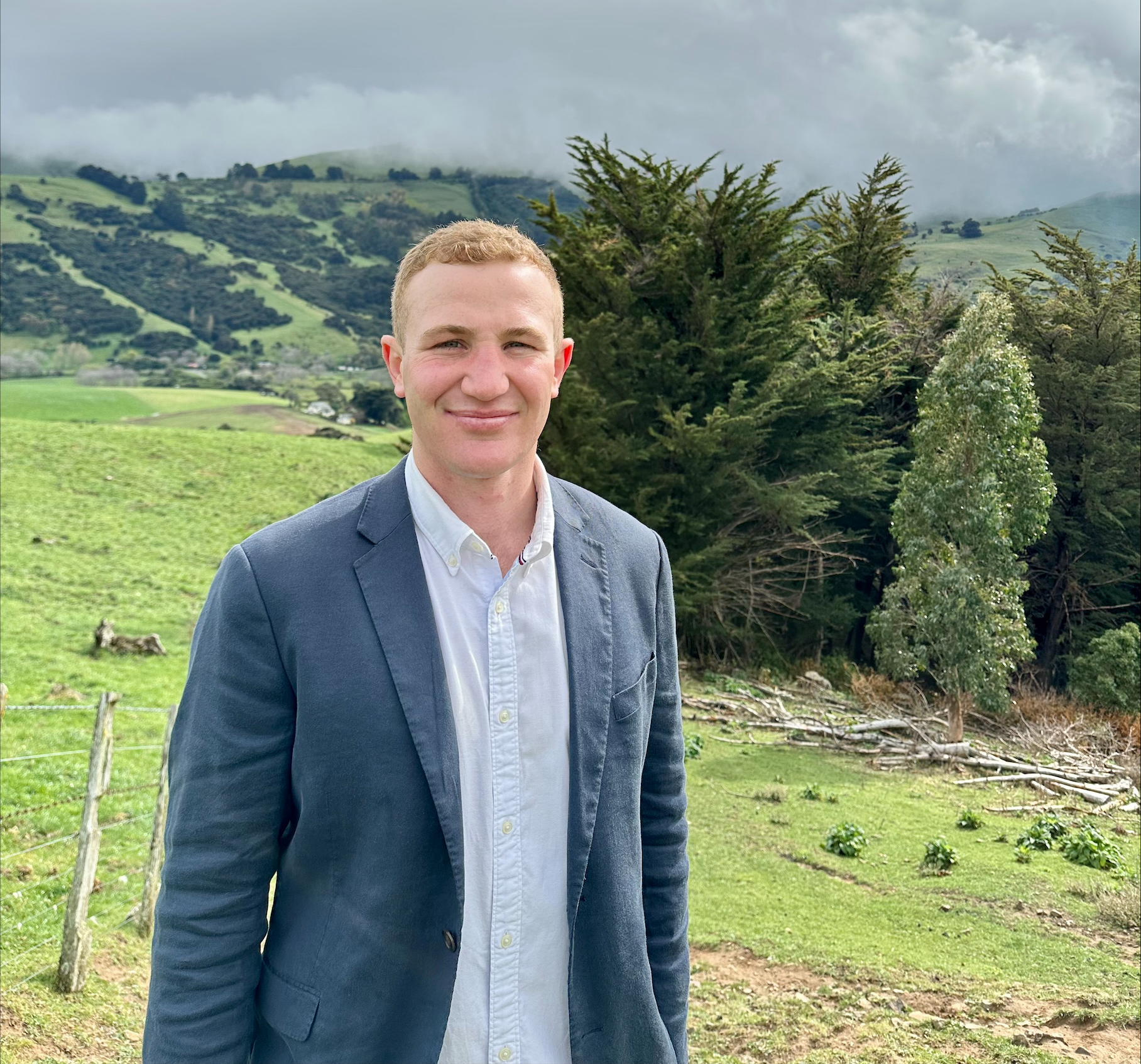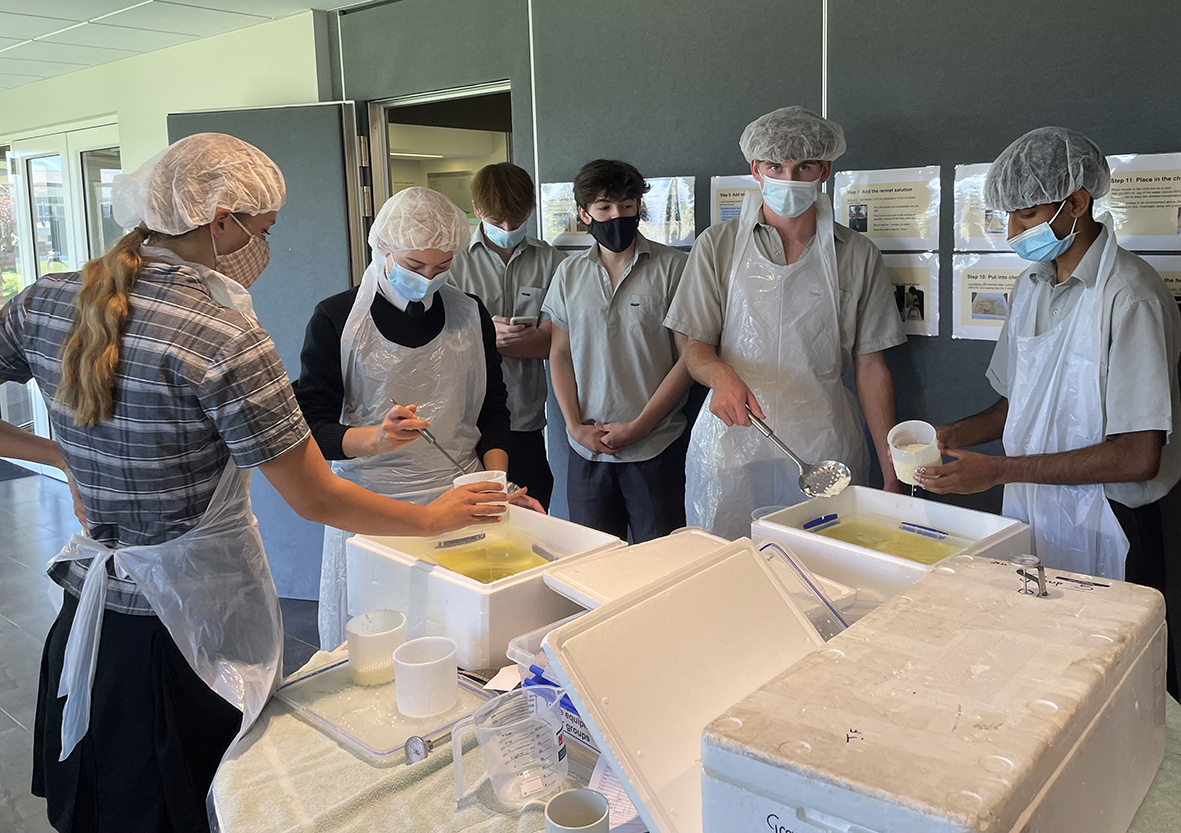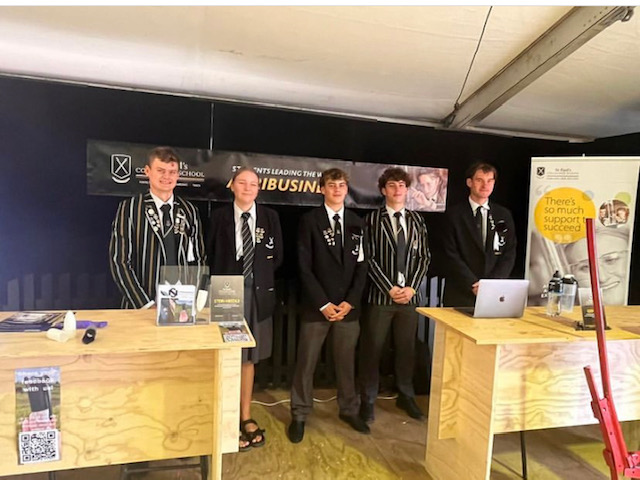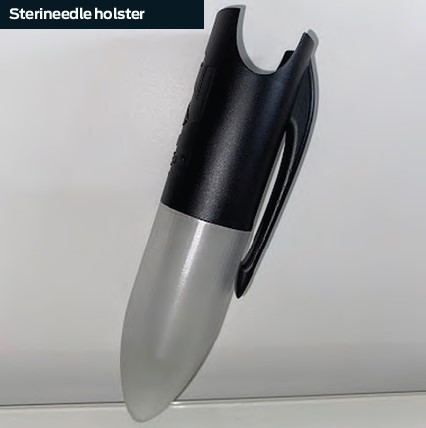Industry Spotlight: Alysia Kepert
Agribusiness in Schools Inspires Western Australia's Education Pathways
Agribusiness education in Western Australia is entering what one of its major advocates describes as the beginning of a new era, shaped by collaboration across education systems, and a deliberate effort to widen who agriculture is for.
Education Program Lead at the University of Western Australia, Alysia Kepert’s, own pathway into agriculture was far from traditional. Growing up in metropolitan Perth with no agricultural background, she enrolled in a Bachelor of Agricultural Science in the mid-90s during a period of significant industry uncertainty.
“It was kind of a naive choice to make. I had no real knowledge of agriculture. The wool industry was collapsing at the time, and agriculture wasn’t exactly seen as an obvious career path. But I was drawn to working outdoors and that sense of community. Once I was in, I loved the people, they were so passionate.”
That early experience continues to shape Alysia’s work today. She has worked for two decades working in and for schools with agriculture programs.
“For me, enabling agriculture to be more visible and accessible is also correcting what wasn’t there all those years ago, which is a pathway into agriculture when you haven’t had a background in it.”
Western Australia’s agricultural education system has long been anchored by five residential agricultural colleges, offering immersive agricultural learning environments. Alysia is clear about their value but equally clear about their limitations in meeting future workforce demand.
"Western Australia’s unique agricultural colleges offer an exemplary education to Year 10–12 students, and they are experiencing very strong demand. But relative to the high school population here in Western Australia, it’s a fraction of what it could be if we diversify approaches and broaden into mainstream education schools. We need to reach many more students who could benefit from learning about agriculture to meet the scale, challenge, and present meaningful careers to students, including those with low familiarity of agriculture.”
In Australia, each state uses their own senior secondary agriculture curriculum. In Western Australia, the Australian Tertiary Admission Rank (ATAR) Agriculture courses always had an annual enrolment under 100 students.
“On paper, that looks like a very small number, and it makes it very hard to advocate when you’re trying to justify it through enrolments alone. But that number doesn’t tell the whole story about the importance of the industry or the growing need.”
The previous ATAR courses were developed based largely on the small number of specialist schools engaged in agriculture at the time, rather than the potential for broader delivery. “The way the courses had been designed, predominantly for delivery at schools with commercial farms, became a bit of a barrier to drive expanded uptake by mainstream schools. It limited where and how agriculture could be taught.
With declining enrolments in ATAR Agriculture, course design was reviewed. It was determined that a curriculum overhaul was needed to more broadly appeal to schools.
A shift in thinking came after Alysia visited New Zealand in 2019 and was introduced to agribusiness education that was explicitly designed to respond to workforce demand.
“What was really clear from my NZ engagement, was that there was a workforce demand that wasn’t going to be met through business as usual, and the secondary system had a place in helping to solve that.”
A five-year redevelopment process, delayed by COVID 19, led to Western Australia introducing two new senior secondary ATAR courses in 2024, Agribusiness and Agricultural Science and Technology.
The first cohort sat Year 12 exams in 2025, and early enrolments suggest participation is already broadening.
“We’ve now got seven schools delivering Agribusiness and two delivering Agricultural Science. Year 11 enrolments for 2026 look to have already doubled compared to our first intake, and while numbers are still small, they are heading in the right direction, and the initial uptake has been quicker than I expected.”
Alysia believes that changing perceptions is as important as changing the curriculum.
“If students feel like they belong and can see a future for themselves, then we’re doing something right. If industry are supportive, then we are on the right track. And we acknowledge that connecting with the NZ ag education community has influenced our new opportunity.”
Student Spotlight: Ethan Ham
An Agribusiness Student's Journey into Food Innovation
Year 13 agribusiness student at St Paul’s Collegiate School, Ethan Ham, has spent most of his life on his family’s dairy farm in Horsham Downs, surrounded by the daily grind of milking, feeding and managing livestock. But at the Massey University Food Innovation Youth Summit, Ethan stepped into a space where science and technology intersect, showing him that the future of food is as dynamic as it is delicious.
“I wanted to see what Massey could offer and get a sense of the opportunities in food science. I was curious to explore how ideas move from concept to product...and how young people can shape the industry.”
At the Summit, Ethan delved into the intricacies of food production. He learned how scaling up processes transforms a small dairy operation into a full-scale factory, and gained insight into the product development workflow. But the highlight for Ethan, was a sensory experiment that challenged everything he thought he knew about taste: changing lights, sounds and environments completely altered the way he experienced the same foods.
“The red light blind taste test was mind blowing. Without colour or visual cues, the same flavours can taste completely different. It makes you think about how much goes into creating food experiences.”
Equally valuable were the connections he made with peers who share his passion.
“It was great to exchange ideas and see how different perspectives can spark innovation.”
For Ethan, the summit reinforced skills he’s been building through his agribusiness classes at school, where he’s learned how to strategically plan, creatively think and take on new opportunities.
“Go for it, even if you’re unsure. Some opportunities you won’t get anywhere else.”
Partnership Spotlight: Grace Coogan
Grace Coogan Awarded Fonterra Agri-Teacher Scholarship to Support Her Shift From Industry to Classroom
Grace Coogan has always been at home in the world of agriculture, growing up immersed in rural life and raised by a family of farmers. But it’s not just her roots that set her apart, it’s her natural ability to connect with people. “I’ll talk to anyone and everyone” she laughs, a quality that has helped her build strong relationships throughout her career. Now, she is taking her passion for the primary sector in a new direction as the winning recipient of the Fonterra Agri-Teacher Scholarship.
The scholarship, created through a partnership between Fonterra and Agribusiness in Schools, is designed to support aspiring agri-educators, and for Grace, it represents both recognition and momentum for the path she’s been building toward.
Grace’s aspiration to teach began early. She recalls playing ‘teacher’ at home with her siblings at the age of 5, despite not always enjoying school. That changed in Year 12 when she met her Agriculture teacher.
“I thought, ‘I want to be like her. I want to be in education where I’m going to have a positive influence on students and open up the gates for them’.”
Her teacher encouraged her to attend university not as a safety net, but because she recognised Grace’s potential.
“She never told me to go to university so I had something to fall back on. She said it because she knew I actually had a passion for something else.”
That encouragement led Grace to pursue a Bachelor of Agribusiness, majoring in farm management at Massey University. “I didn’t even know Agribusiness was a thing. Now I love it.” she says.
During her studies, a summer placement with the Taranaki Regional Council introduced her to the work that would shape her career. She later became a Land Management Officer, working directly with farmers across the ring plain to improve environmental outcomes through riparian planting, waterway protection, and farm planning. The role allowed her to make tangible impacts while building relationships.
Grace’s journey has seen her gaining extensive industry knowledge and practical skills that she believes will benefit her in the classroom environment.
"Knowledge, experience, communication, time management, leadership. All of it. Everything I’ve learned will help me teach.”
Grace is also aware of the need for better agri-education.
"There’s a lack of education around the primary sector, what you can do in it, how many people work in it, and how important it is for our country.”
The significance of the scholarship extends beyond funding.
“It wasn’t all about the financial support. It was the industry alignment. Having Fonterra and Agribusiness in Schools behind me made me want to apply.”
Grace views Fonterra's backing as a powerful endorsement of the sector and the role of teachers within it.
“For Fonterra to come forward and go, ‘We want to help younger people get into agriculture,’ is huge. Because it’s such a big industry name, it’s huge for the government to notice as well. It shows they want to get people into ag.”
With an unwavering commitment to a future in education, Grace moves forward with pride and a strong sense of purpose. Motivated by her own experiences, she is deeply intent on extending to others the same encouragement, guidance, and inspiration she received during her Year 12 journey. Through her dedication, she aims not only to support students academically but also to empower them with confidence and belief in their own potential.
“If you’re willing to learn and open-minded, you can do anything in the primary sector.”
As Grace steps into teacher training, she is guided by a deeply rooted purpose: to ignite curiosity, nurture a love of learning, and foster a genuine passion for the primary sector in every student she teaches.
Drawing on her own experiences and growing expertise, she understands the significant role education plays in shaping young minds and opening pathways to future opportunities. With the backing of Fonterra and Agribusiness in Schools, Grace is well equipped to bridge the gap between classroom learning and industry, bringing relevance, inspiration, and innovation into her teaching practice.
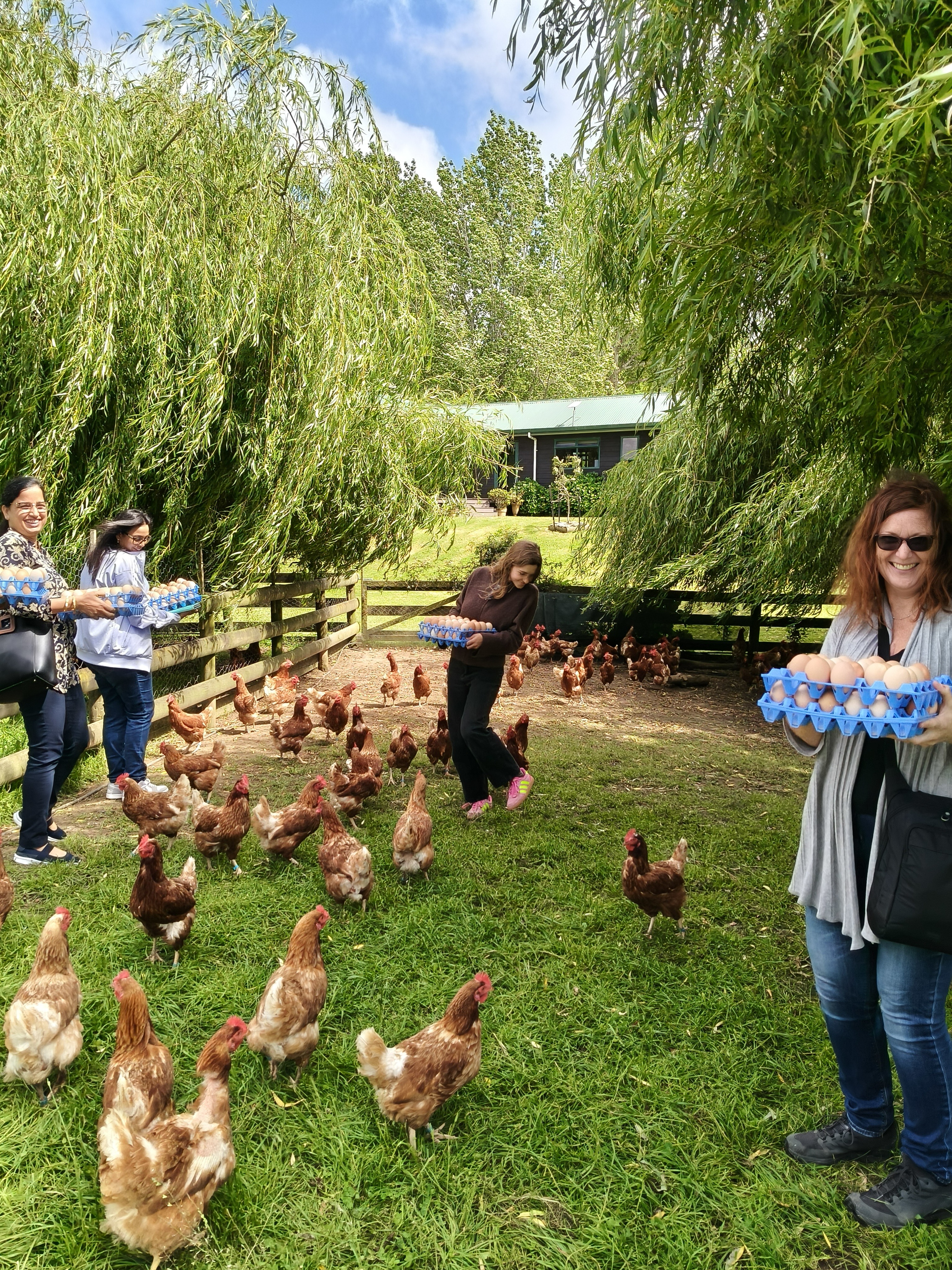 Education Spotlight: Teachers' Day Out
Education Spotlight: Teachers' Day Out
Bridging the Gap Between Classroom & Industry
Teachers’ Day Out 2025 brought educators and industry partners together with a mutual purpose of strengthening agri-education through industry-led insights, industry trips and industry practice.
Across Auckland and Taranaki, 35 teachers from 21 schools stepped out of their classrooms and onto working farms, orchards and agribusinesses to deepen their understanding of New Zealand’s primary industries. For many, this connection to industry is something they can’t get anywhere else. As one attendee put it “Talking to New Zealand growers and listening to their experiences” was the most valuable part of their day.
Our Teachers’ Day Out is a professional development day designed to instill confidence and industry knowledge to help educators engage students with the food and fibre sector. It fills a crucial gap. Many teachers teach agribusiness or agriculture while having limited options to see these systems in action. And for industry partners, Teachers’ Day Out is an opportunity to show educators the skills and career pathways embedded in their organisations.
In Auckland, teachers visited Puriri Downs Free Range Eggs, True South Seafood and Omaha Organic Berries. Each site offered a different perspective - animal welfare and sustainability at Puriri Downs, innovation and environmental challenges in oyster farming at True South Seafood, and organic production and market pressures at Omaha Organic Berries. Teachers appreciated how these visits translated directly into classroom contexts, with one noting that the flip-farming oyster system was something they planned to use in Level 3 Agribusiness.
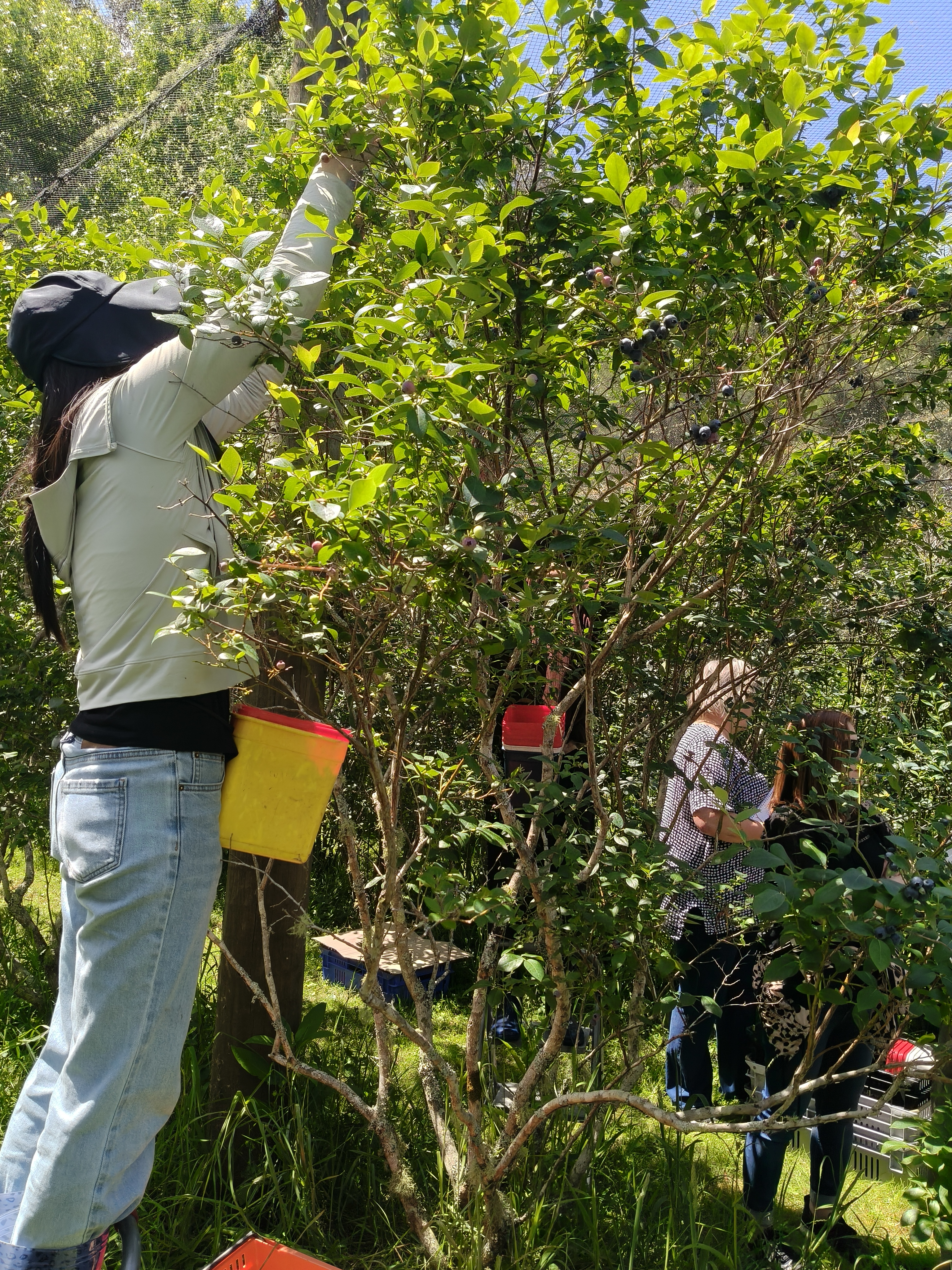
In Taranaki, visits to Slater’s Orchids, Faull Farm, and Natural Fare highlighted the breadth of local production, from export floriculture to large-scale dairy and hydroponic herbs. Teachers found the diversity eyeopening, especially when seeing the technology and decision-making behind each operation. Several attendees commented on how valuable it was simply to be on-site and able to connect with the experts, gaining the kind of practical insight that classroom resources can’t provide.
Across both regions, one theme stood out: connection. Teachers valued meeting industry leaders who were open about their challenges and innovations, and they valued meeting each other just as much. One attendee gives this feedback, “Chatting with other teachers about their programmes...learning lots from local businesses,” was a highlight for them, with teachers from smaller schools emphasising how rare and important these kinds of opportunities are.
For industry partners, Teachers’ Day Out offers a chance to support the educators who are shaping their future workforce. For teachers, it offers real examples, fresh stories and renewed confidence. These are tools they can take back to their classrooms to create richer and more relevant learning experiences.
Teachers saw innovation in action, explored the challenges and successes of various businesses, and discovered diverse career pathways in the sector. Many left inspired, with practical examples and fresh ideas to bring directly to into their lessons.
More than professional development, Teachers’ Day Out 2025 inspired our educators to make agri-education richer, more engaging and relevant for every student.
Event Spotlight:Fieldays Cocktail Evening
Highlighting the Future of Agribusiness Education
Our recent Agribusiness in Schools Fieldays Cocktail Function brought together key figures from government, education, and the primary industries to celebrate the ongoing success and future ambitions of the Agribusiness in Schools programme.
Our Chair of the Agribusiness in Schools Board, Campbell Parker, kicked off the evening with a warm welcome and introduction to some of our new funding partners, namely Fonterra. We also heard from Martin O’Grady, Agribusiness in Schools Relationship Manager, and Kerry Allen, Programme Director.
The Agribusiness in Schools programme started in 10 schools, and is now in 125 schools throughout New Zealand, with over 20,000 students having been enrolled in the programme.
With the primary industry being pivotal to the New Zealand economy, it is essential that our younger generation are actively learning all aspects of the agriculture industry, and for our momentum of success to continue, we need to have well-qualified, passionate and enthusiastic teachers to teach the programme. This will lay an essential foundation to our future farmers in New Zealand.
The progress of the Agribusiness in Schools programme is largely due to the commitment, dedication, and support of our strong partnerships between industry, government, and education. Campbell Parker reinforced the vital role of Food and Fibre education in sustaining New Zealand’s economy and building a future-ready workforce. The Agribusiness in Schools programme is a standout example of cross-sector collaboration, with special thanks to our Principal Partners – St Paul’s Collegiate School, DairyNZ, and Beef + Lamb New Zealand - for their foundational support.
We also took time to recognise the unique partnerships that launched the initiative, having started as an idea in 2013, along with the financial and strategic backing of the business sector and the dedication of key individuals, including, Grant Lander, Peter Hampton, Hon. Nathan Guy, Tony Egan and Peter Nation. We still have unfinished business ahead, objectives for our programme and challenges still to be tackled in delivering equitable and effective agribusiness education nationwide, however having the evening with some of our key industry leaders was a lovely time to reflect and spark up new ideas for the future.
 Education Spotlight: Careers Expo 2025
Education Spotlight: Careers Expo 2025
Connecting with the next generation of industry leaders
For many students, the prospect of a career in the primary sector might seem distant or even invisible. But Kerry Allen and her team across the Agribusiness in Schools and Sow the Seed programmes are changing that perception. Agribusiness in Schools and Sow the Seed bring the possibility of the primary sector directly to students at career expos, showing that agri-careers are not only essential to New Zealand’s economy, but can also be exciting, innovative and rewarding.
The team attended multiple expos throughout the North Island. Tauranga STEM Festival, Cultivate Your Career, Waikato Careers Expo and Fieldays to name a few. Kerry highlights the importance of these programmes at expos, especially due to a lack of primary sector presence.
“There’s no other primary industry presence at most of these events...It’s important to put these careers in front of the students so they’re visible and don’t get overlooked.”
At every expo, the team engages directly with students, helping them understand what the primary industries are, how they operate, and the variety of careers they offer. Using a range of interactive and insightful resources such as the “Where Does Your Food Come From?” board and Careers Wheel. The team provides students with a hands-on, practical introduction to agri-careers encouraging them to explore the possibilities within the sector.
“We try to get in front of every child that walks past us - If they don’t know anything about primary industries, we give them a little insight into the sector and highlight what they could potentially do.”
The impact of these interactions is tangible. Students often show genuine interest, sometimes recalling previous encounters at Fieldays or engaging in discussions sparked by the career wheel.Immersive tools like Sow the Seed’s Mātiki Minecraft initiative, help bring primary industries to life for younger audiences, allowing students to explore concepts in a fun, interactive way. Kerry notes that managing these activities requires coordination, but they consistently capture the attention of students, making learning about the primary sector both engaging and accessible.
The presence of Sow the Seed and Agribusiness in Schools at career expos is more than representation. It’s about opening students’ eyes to the exciting possibilities within the primary sector.
“Primary industries offer a wide range of careers that are exciting, meaningful, and often surprising. These expos are a chance to make that visible and inspire students to pursue agri-education”
The Agribusiness in Schools and Sow the Seed programmes are giving students a clearer, more exciting understanding of the opportunities available in the primary sector.
Through practical learning and meaningful exposure to the sector, these initiatives highlight the value of pursuing agri-education and showcase the diverse careers the industry offers.
Agribusiness in Schools and Sow the Seed will continue to attend expos in 2026 giving students hands-on insights into the vibrant and evolving primary sector.
“We have a lot of work to do in preparation for the new year but we will be back in full swing at these expos.”
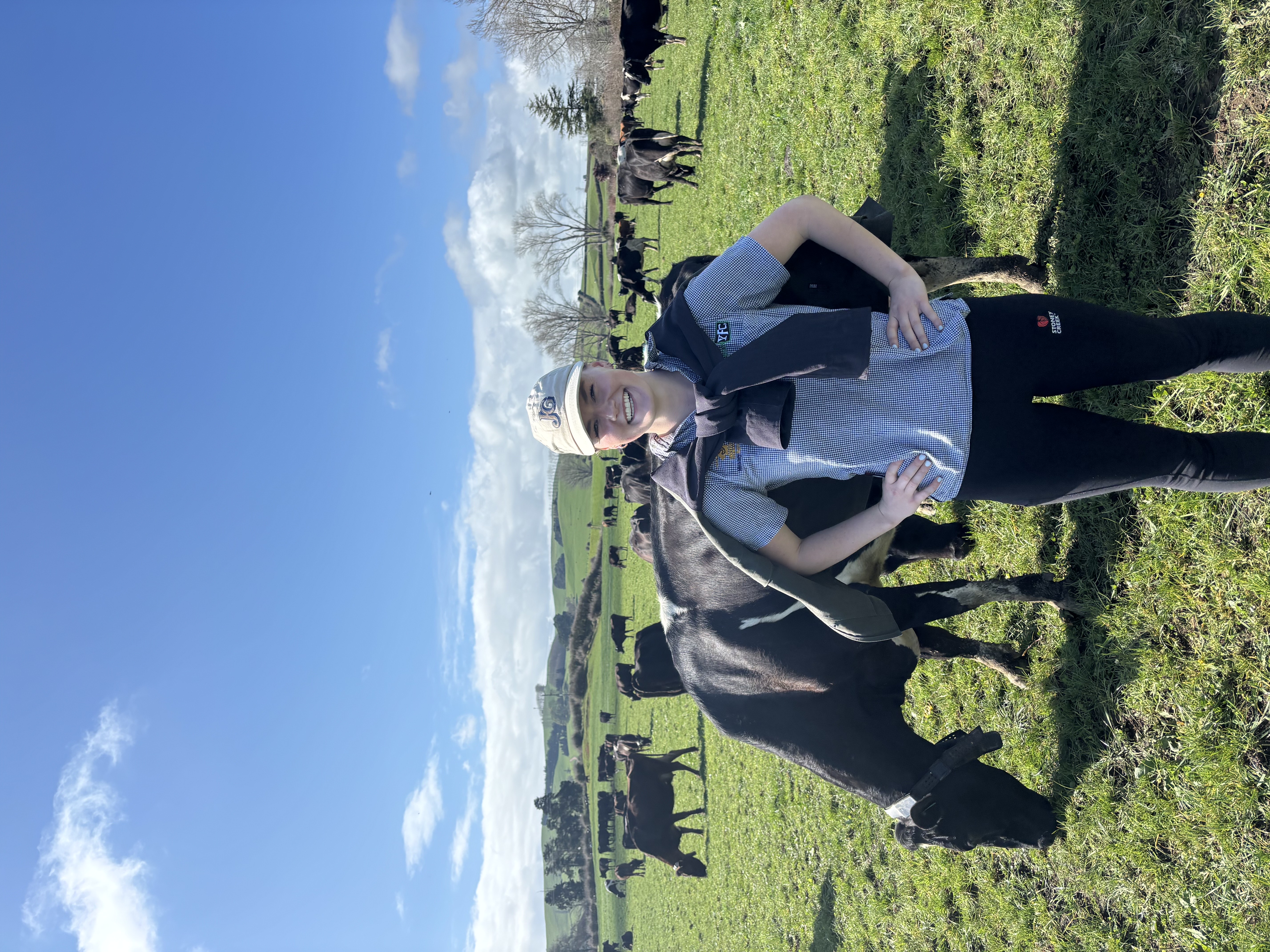 Industry Spotlight: Rose Young
Industry Spotlight: Rose Young
The Role of Agri-Education in Modern Farming
AgriTech is transforming one of New Zealand’s key industries by integrating modern technology with traditional agriculture, opening up limitless possibilities for innovation while ensuring the sustainability of our vital food supply.
At just 22 years old, Rose Young embraces this evolving field with passion and dedication, now working at Halter as a Virtual Fencing Support Specialist, where she helps to support productive and sustainable farming. Fueled by a strong academic background in Agricultural and Horticultural Science and Agribusiness from Mount Albert Grammar School, Rose understands the vital role that agri-education plays in shaping the future of farming. Her deep-rooted passion for agriculture is evident in her work today, but it first took shape in the classroom.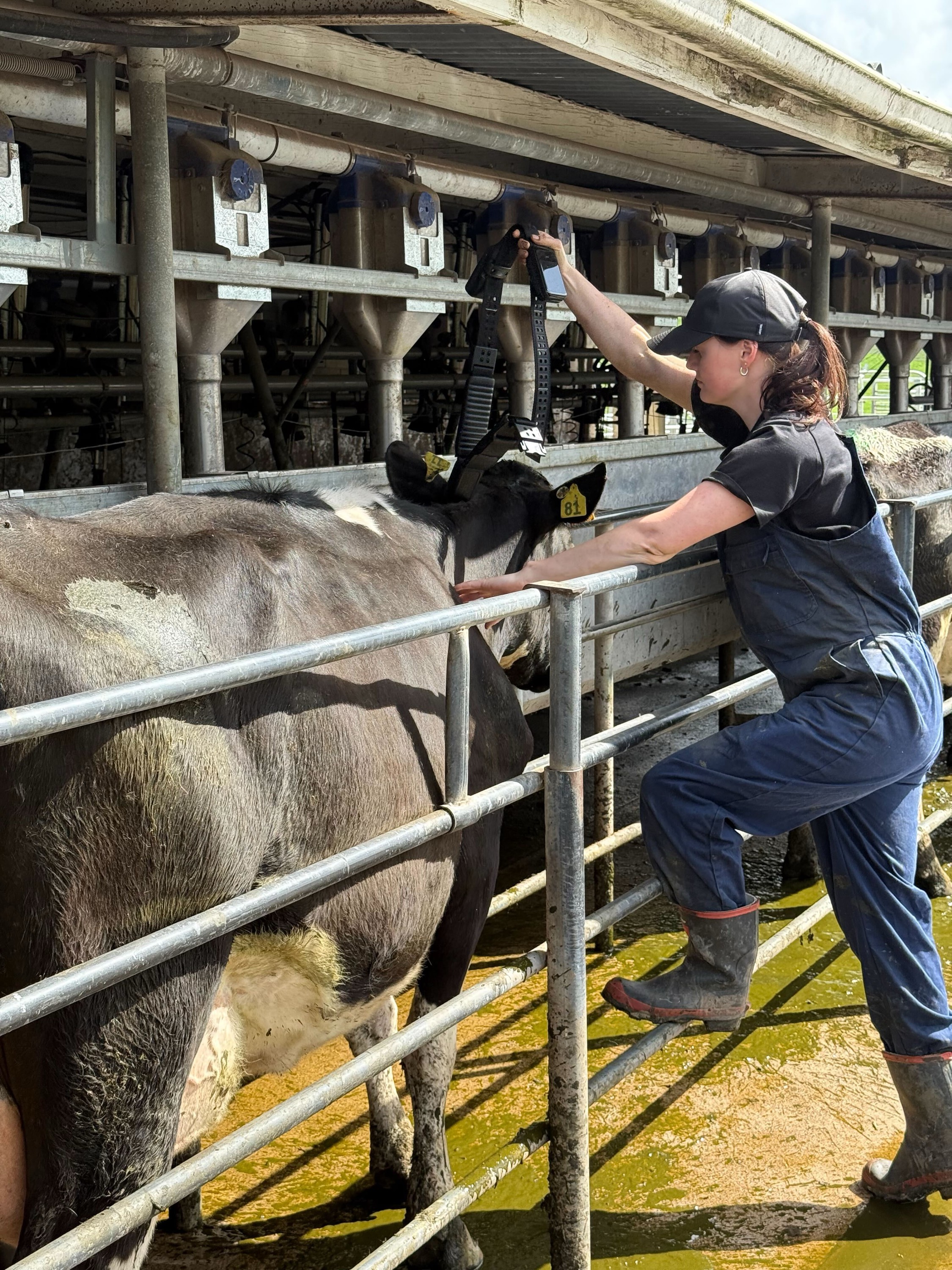
"Being able to study those subjects within an urban environment was something incredibly special because I suppose not many people would expect to, or have the knowledge and experience to go down those career paths from the city. Studying ag science and agribusiness at school grew my passion to go into the industry. I owe a lot to the connections and skills gained in those classrooms."
Rose acknowledges that her studies in Agriculture has been instrumental in shaping her career, particularly through the invaluable networking opportunities it provided throughout her secondary and tertiary education.
She engaged with a diverse scope of knowledgeable individuals, from passionate peers to experienced professionals and educators.
These connections enriched her academic journey, fostering collaboration, mentorship, and professional growth, culminating in her role at Halter, a global leader in pasture control.
At the forefront of agricultural innovation, Halter is a New Zealand founded company transforming how farmers manage livestock. Utilising smart cow collars and replacing traditional fencing by using virtual boundaries controlled through an user-friendly app.
The collars allow farmers to keep their animals contained within virtual fences, among other things. Rose contributes as a Virtual Fencing Support Specialist, guiding farmers to successfully implement and maximize this technology. She is part of a team that is advancing sustainable farming through efficient tech-driven solutions.
Rose’s dedication to her role at Halter mirrors her long-standing passion for agriculture. She speaks enthusiastically about the variety her job brings. Each day presents new challenges and opportunities, from collaborating with a diverse team to supporting farmers with effective stock management solutions.
"Every single day is incredibly different. An ordinary day can consist of working with the customer support team to address any issues farmers might be having, reviewing our product in a live setting, validating firmwares and then getting to work in our super cool office which happens to be a converted calf shed. And I think what’s really special is that we're such a big team, and there's so many different sort of subteams working on different parts of the product that all come together for the good of what we're creating, and in turn, the good of our farmers. "
Throughout her studies and early career, Rose had been deeply influenced by the connections she’s built along the way. She credits Dairy Women’s Network, whom provided valuable support and encouragement that inspired her to continue her studies in agriculture.
Being part of a community of passionate and experienced women gave Rose both confidence and motivation, reinforcing her commitment to the industry and helping her pursue meaningful opportunities in the primary sector.
"I was privileged to receive an internship with Dairy Women’s Network. I learned so much. I progressed within my career, I met so many incredible people that I'm so proud to call colleagues and friends. The three years I spent with them were some of the most formative of my life."
Driven by her passion for agriculture and a desire to make a meaningful impact in the industry, Rose pursued her studies at Massey University, graduating with a Bachelor of Agribusiness, majoring in International Agribusiness, while also working with Dairy Women’s Network. Balancing study and work, she gained valuable industry experience and built strong connections that supported her academic and professional journey.
Rose is particularly proud of her decision to remain true to her passion for agriculture, consistently pursuing a path aligned with her interests and values, despite external pressures to consider alternative directions.
This steadfast commitment has not only shaped her own success but also reinforced her belief in the importance of the industry. Looking to the future, Rose recognises significant potential for the next generation of industry leaders to make their mark in what is arguably one of New Zealand’s most critical and enduring sectors.
"Agriculture is New Zealand's biggest and dare I say, most important industry, which is why there was such an uproar with the removal of Agricultural and Horticultural Science and Agribusiness as standalone subjects in secondary schools. Without them, I wouldn’t be where I am today and I can’t fathom that. I can’t imagine a world where I’m not working in ag or involved in ag in some capacity. I’m passionate about inspiring young people to pursue a career in the sector regardless of whether they’re from a farming background or not. They can do it."
 International Spotlight: TERRAMI (Korea Rural & Territorial Development Institute)
International Spotlight: TERRAMI (Korea Rural & Territorial Development Institute)
Korean Students Experience Kiwi Agriculture
A group of agriculture students from Korea recently visited St Paul’s Collegiate School as part of a unique international exchange arranged by TERRAMI, a private research institute in Korea dedicated to strengthening agricultural knowledge, rural development, and sustainable primary industries.
The students were part of the 2025 Future Agricultural and Vocational High Schools Capacity Building Overseas Field Training programme. This intensive study tour offered them a unique opportunity to gain hands-on experience and deepen their understanding of New Zealand agriculture.
Agribusiness in Schools was proud to host these incredible students, with support from our partners at DairyNZ. The students explored the diverse nature of Kiwi agriculture. From the science that drives our pastoral systems to the essential skills that keep the sector moving forward.
Dairy NZ’s contribution to the visit was fundamental, offering the students insights into dairy genetics, pasture management, and the broader role of science and innovation in lifting sector-wide performance. A highlight of the visit was a live demonstration of calving a cow and learning all about artificial insemination, giving students the opportunity to learn directly from industry professionals about the precision and expertise behind modern breeding practices. They also explored the significance of New Zealand’s iconic beef, building connections between the theory they learn at school and the reality of farming in a different part of the world.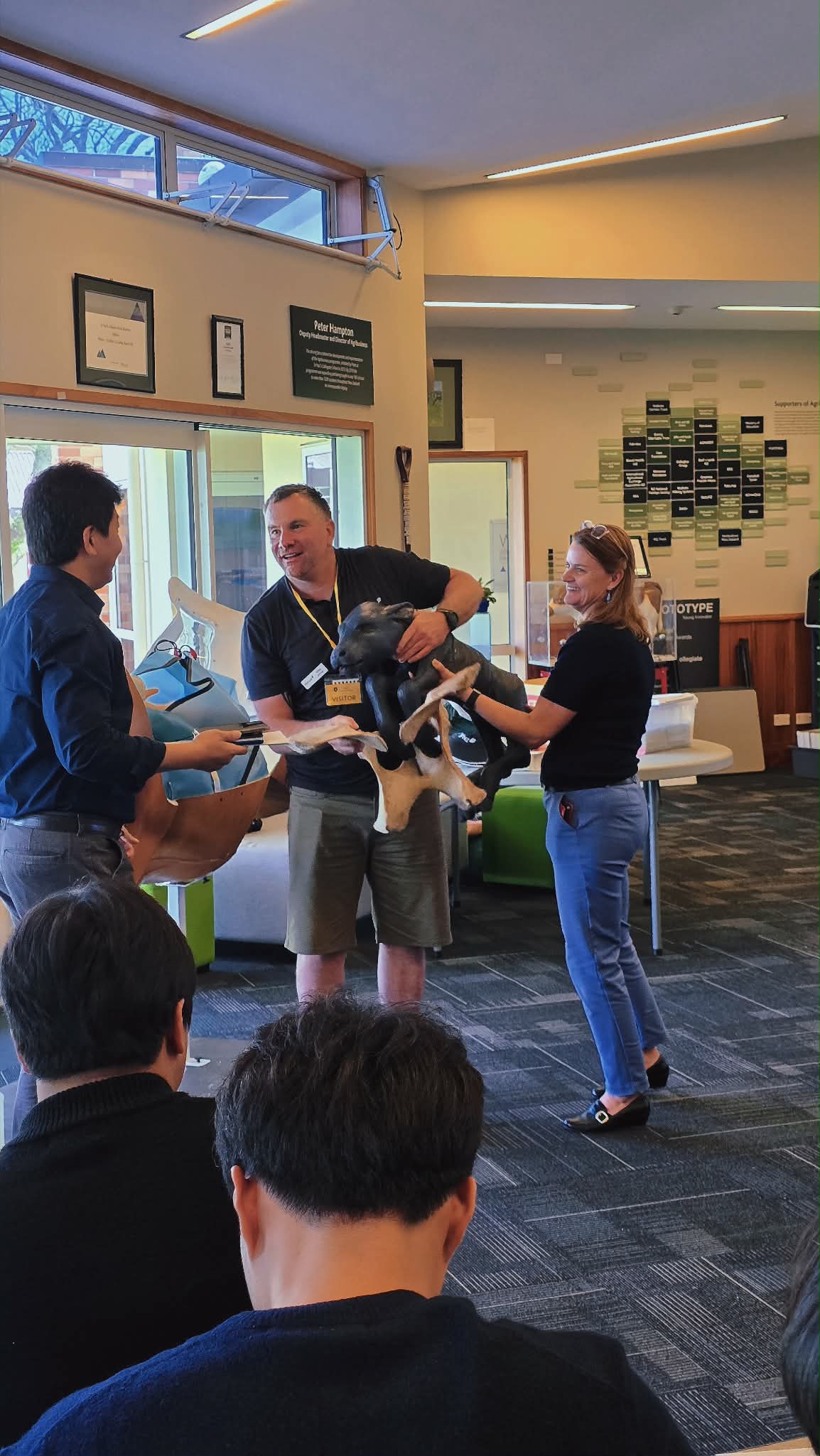
TERRAMI, the organisation that selected and prepared the students for this overseas programme, sees education as a vital link between people, the land, and the communities that rely on it.
In Korea, TERRAMI focuses on strengthening rural economies, modernising agricultural policies, and empowering young people to take pride in the future of food and farming.
Their dedication to international knowledge sharing closely reflects Agribusiness in Schools’ own mission which is to provide meaningful learning experiences that are deeply connected to New Zealand’s primary industries.
Hosting students from abroad reinforces the value of agri-education not just for New Zealand students, but for global learners who view our country as a leader in sustainable, science-driven agriculture.
Exchanges like this one highlight that agriculture does not stand still, nor does it exist within borders. The challenges and opportunities facing food systems are shared worldwide, and young people are increasingly the ones bringing fresh perspectives and cross-cultural understanding.
This worthwhile venture would not have been possible without the support of DairyNZ. Their willingness to share expertise and champion agricultural education ensured that the students’ visit aligned with the high educational standards we aim to deliver at Agribusiness in Schools.
The experience emphasised the value of continued collaboration between countries committed to strengthening their primary sectors. Opportunities like this broaden understanding and inspire the next generation of global agricultural leaders.
Student Spotlight: Graciela & Bailee
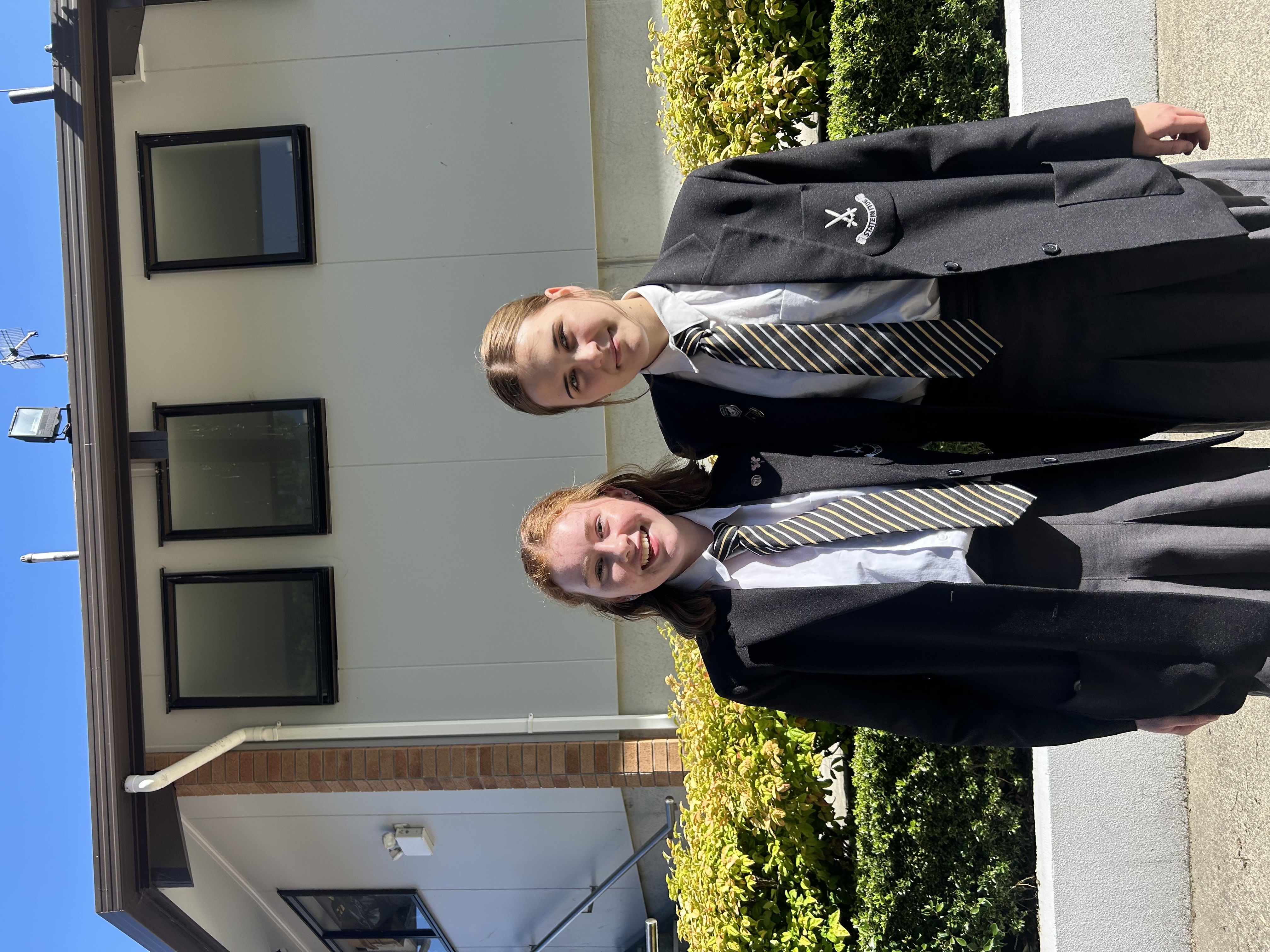 Students thrive in Agribusiness with the support of the Donny Trust Scholarship
Students thrive in Agribusiness with the support of the Donny Trust Scholarship
At Agribusiness in Schools, the next generation of industry leaders are discovering where their passion for agribusiness can take them. And what better place to explore it than at St Paul’s Collegiate, where agribusiness education first took shape and continues to flourish today?
For students like Graciela and Bailee, the Donny Trust Scholarship has been a gateway to hands-on learning, industry experiences, and a chance to turn their passion for agriculture into a future for themselves.
Graciela’s passion for agriculture comes naturally. Growing up on a family dairy farm in Australia with parents who have always worked in the ag sector. Bailee shares a similar story, having been raised on a farm from the young age of five years old. Both students have embraced agribusiness not only as a field of study, but also as a way to connect their personal interests with practical skills and potential careers.
Their education at St Paul's Collegiate has shown them the breadth of opportunities within agribusiness. Graciela talks about how she’s enjoyed the variety of the subject, from dairy farming to visiting businesses in action, while Bailee finds it fascinating to see how products are made from raw ingredients to finished goods.
Beyond the classroom, they have engaged in trips, programs and mentorship opportunities, all of which have broadened their understanding of the primary industries. Bailee reflects,
"I really enjoy seeing how products are made from the raw ingredients to the finished product."
The Donny Trust Scholarship has been instrumental in shaping their educational journeys, enabling them to attend St Paul’s Collegiate, a school renowned for nurturing young learners and fostering excellence in agri-education. Widely respected for it’s seamless Agribusiness programme, which equips the next generation of industry leaders with the skills, knowledge and confidence they need to thrive in the primary sector.
Looking ahead, both students have ambitious plans. Graciela is considering further study at Lincoln University while Bailee is applying to study a Bachelor of Agribusiness and Food Marketing at the same university. Graciela also hopes to return to the family farm in the future.
"I definitely want to keep in ag and go back to the family farm, that's always been super exciting for me."
Bailee hopes to continue in the dairy industry:
"I definitely want to do something in ag, hopefully in dairy farming."
Both are aware of the growing need for young people in the primary industries and are excited by the diversity of the available careers. Graciela notes the ongoing demand for young farmers, while Bailee emphasises that farming encompasses much more than traditional dairy work.
" It's important to show the variety of things your field of work has to offer. Farming isn't just about farms anymore."
Graciela offers advice to those considering agri-study.
" Take all the opportunities you get. Apply for everything. You don't have to be from a farm. If you have a passion, you should pursue it."
Thanks to the Donny Trust Scholarship, Graciela and Bailee have been able to fully immerse themselves in agribusiness, exploring everything from handson farming to the business side of the industry.
Agribusiness in Schools would like to thank Graciela and Bailee for their hard work, dedication and commitment to exploring the opportunities within agribusiness. We are excited to see where their journeys take them next.

Industry Spotlight: Grace Burmeister
BNZ Agri-Partner helping farmers with change through financial advice and support
The strength of our rural communities is built on the expertise, knowledge and dedication of those in primary industry roles. Within this collective of the proficient and agri-educated is Grace Burmeister who resides in Taranaki as an Agribusiness partner at the Bank of New Zealand.
In addition to having a wealth of knowledge surrounding the wellbeing of farmers and their operations, Grace has built a strong reputation for her commitment to supporting farmers by combining financial literacy with her exceptional people skills.
"I work directly with all kinds of agribusiness farmers. Dairy farmers, sheep and beef right through to forestry as the main account manager. The variety of people that we get to rub shoulders with day to day is really unique. We could be having lunch with the Prime Minister one day and the next day be on farm in the milking shed with clients."
Grace’s natural ability to engage with such diverse clientele allows her to understand their unique challenges and tailor her support accordingly. Her commitment goes beyond the business as she truly cares about the wellbeing of farming communities and recognises that they are the backbone of our country’s most vital resource: food.
"I think it’s important for people to understand that the primary industries are the part of the economy that never stops and never fails to provide."
The primary industries play a crucial and often underappreciated role, working tirelessly to provide some of our most essential foods without pause. Grace collaborates directly with the individuals who support the primary industries, working both within the sector and alongside its people. She highlights that appreciating the importance of these industries helps us recognise the effort and and strength of those who sustain them.
Grace’s role as an agri-partner offers a rewarding blend of hands-on experience and corporate responsibilities. She appreciates this balance and believes it’s what makes a career in agribusiness so fulfilling.
"Typically I try to do about 40 to 50% on farm whether that be annually catching up with farmers, doing farm drives, and the other 50% I might be in the office doing admin, organising meetings with accountants, lawyers and real estate agents. As a farm kid myself I enjoy the combination of working outdoors and indoors."
Growing up on a dairy farm, Grace’s passion for agriculture was nurtured from an early age, gaining valuable first-hand experience and a strong connection to her farm-based communities. This foundation was strengthened through her agribusiness studies in secondary school, which provided her with essential industry knowledge.
Grace further advanced her expertise at Massey University, where she studied agri-commerce majoring in farm management. Combining her upbringing with academic excellence, she is well-equipped to understand the operational aspects of farming, allowing her to support farmers effectively and contribute meaningfully to the primary industries.
"I always wanted to get into banking. As a kid in primary school, we did an activity around depositing and banking. And I loved that. Even though it’s not my actual role now, I suppose that was kind of where my love for banking started. It’s super unusual knowing what I wanted to do so young."
The primary industries faces economic challenges including fluctuating commodity prices and market uncertainty. Grace helps farmers navigate these pressures by assessing their unique circumstances and tailoring solutions to support their needs.
"Low payouts and commodity prices will continue to be a challenge for farms so it is my job to work alongside farms to structure their debt and needs no matter the farming cycle we are in."
Grace finds her role as an agripartner highly fulfilling, as it enables her to support farmers in achieving their financial objectives and key milestones.
Through her work, Grace remains committed to supporting the primary industries by helping farmers improve financial performance to ensure long-term sustainability and success. She encourages those aspiring to a career in ag to be open-minded and confident as they explore new opportunities.
"The best thing you can do when you’re starting out is, don’t say no, because it might close a door that might not reopen again."
Industry Spotlight: Hugh Jackson
Foundation Agribusiness Student takes out FMG Young Farmer of the Year Title
The Agribusiness in Schools cohort can’t help but watch on in pride as a former Agribusiness student celebrates being crowned the 57th winner of the FMG Young Farmer of the Year.
Hugh Jackson, 27, expresses the relief he felt after being announced as the 2025 winner and understandably so. Having competed in previous years, 2025 marked his second time as a Grand Finalist but his first time as the overall winner. Past competitions saw Hugh committing to learning about the ins and outs of the event, industry networking and a great deal of volunteering.
This year, with substantial preparation, a great support team and the pressures of maintaining healthy eating and sleeping habits, Hugh has walked away not only with a well-deserved win, but also with the comfort of knowing that his hard work had paid off.
"It’s been 8 years or so in the making. I’ve been competing pretty much every year and helping organise as well. I managed to qualify back in 2023 and finished in third place so I learnt a lot going through that process. This time round, I was more organised and had a few more people lined up early to help give me ideas. It was a very heavy workload and a very long road but we got there in the end."
The agricultural competition boasts several gruelling yet exciting challenges, both theory-based and technical. It’s a test of strategy, knowledge and skillset. All of which Hugh surpassed in what he humbly describes as a ‘consistent’ manner.
Alongside seven Grand Finalists, Hugh represented the Waikato-Bay of Plenty in a number of practical tasks including shearing sheep, building bridges and baling hay. Hugh’s theoretical skills were also tested in other challenges such as public speaking and quizzes, but over the course of the jam-packed event, his favourite part was the excitement of competing in the practical day.
Hugh partaking in the fencing module during the Young Farmer of the Year contest
Hugh acknowledges that his triumph in the competition is not only a testament to his skills and immense preparation, but also the outcome of having great support and ample learning opportunities.
Growing up on his family’s sheep and beef farm in Te Akau, Hugh enjoys rural life, recognising the significant role his parents, John and Jenny have played in shaping his passion for agriculture.
Hugh emphasises his enormous appreciation for his support system, honing in on one mentor in particular who helped him navigate the pressures of the competition.
Ryan McCarthy, Hugh’s former House Master and current Director of Strength and Conditioning at St Paul’s Collegiate assisted Hugh in the upkeep of his fitness. The Young Farmers competition, while exciting with plenty of room for fun, often left little room for rest and respite.
With Ryan’s help, Hugh was able to pace himself for the upcoming event, keeping in line with his physical health enabled him to also be mindful of his mental health. Something which Hugh is a strong advocate for.
Hugh talks about Ryan’s contribution not only to his fitness but to his overall health and thanks him profusely for the role he played in maintaining a healthy lifestyle leading up to the Young Farmers Event.
"Mr McCarthy is a big one who helped. I reached out and he worked with me to create a training programme which I’d complete in and around my work and study regime. Keeping up my fitness was important for the competition and it’s a tool I use to keep myself in a good headspace."
Ryan reflects on Hugh’s steadfast commitment to the rigorous regimen designed to build a high aerobic base through running and improve functional strength and work capacity with bodyweight workouts. He notes that St Paul’s has a vast number of Collegians now excelling in their respective fields, and Hugh is a prime example.
"Hugh's dedication was unwavering. He trained consistently, often before or after a full day of work on the farm, demonstrating a profound commitment to his goal. Hugh’s disciplined approach highlights the level of preparation required for such a high-stakes competition. I believe his work ethic is inspirational, showing Hugh has left no stone unturned in his quest for success."
Here at Agribusiness in Schools, it is no surprise to our programme members that Hugh would accomplish such a victory. Showing promise in his secondary school years as a part of the first group of students to undertake Agribusiness as a subject, we’re incredibly proud of Hugh and wish him well in his future endeavours.
Scholarship student thrives in Agribusiness
Like any prosperous working sector, Agribusiness is sustained not only by dedicated industry workers and extensive advocacy, but by the next generation of industry leaders readying themselves to enter into the primary sector’s exciting and multi-faceted workforce.
Among these young leaders is 17-year-old Charlotte Belz, An accomplished all rounder who has entered her second year of boarding at St Paul’s Collegiate School. With the support of the Donny Trust Agribusiness Scholarship, she is loving everything about school life.
The scholarship assists in funding boarding and tuition costs at St Paul’s and is awarded to students with a stellar academic record, great interpersonal skills and a passion for the primary industries.
"Receiving the Donny Trust Agribusiness Scholarship, and being able to attend St Paul’s has meant that I’ve been able to learn a lot about the agricultural industry and benefit from the school’s specialised Agribusiness programme. The scholarship made it possible for my parents to afford for me to attend St Paul’s as a boarder and benefit from everything the school has to offer. I know they are thankful for the support, and so am I."
Charlotte has a passion for animal care and places emphasis on how the Agribusiness programme is helping her to navigate her way towards a primary sector career, specialising in something she is passionate about.
“At this stage, I plan to attend Massey University to study a Bachelor of Veterinary Science. My three years of Agribusiness studies will be very helpful with my aim of becoming a large vet.”
It is important to acknowledge the organisations that provide students like Charlotte with vast opportunities as it is this support that ensures the primary sector always has fresh new faces coming to lead the future.
Agribusiness in Schools profoundly thanks the Donny Trust for their immense contribution to remarkable students like Charlotte, as well as their unwavering dedication to agricultural education. It is these opportunities that allow the next generation to thrive in their endeavours towards the primary sector.
Agribusiness in Schools also applauds Charlotte for her progress in the Agribusiness programme and is thankful for the contributions she makes to her education to ensure a bright future for herself and the future of the primary sector, who will be lucky to have her on board.
The Future is Growing - FIELDAYS 2024
Day one of New Zealand National Fieldays 2024 started off strong seeing thousands of Kiwis through the gates of Mystery Creek, as well as the usual abundance of exhibitors showcasing the latest primary sector technologies, products and advice. Of course as a programme which creates opportunities for young budding primary sector personnel, Sow the Seed made a very necessary appearance to pass on the most essential thing you could to flourishing industry workers, knowledge!
Situated in the Careers and Education Hub at Site 30, Sow the Seed and Agribusiness in Schools teamed up to give the rundown to Fieldays goers on what the primary sector has to offer them. We were both surprised and thrilled to see what these bright-eyed students had to offer us.
Though unsure of what our exhibition was all about at first, students were keen to chat with the Sow the Seed and Agribusiness in Schools team to find out. A great deal of our visitors come from a rural background and are hoping to follow in the footsteps of their older family members. Others wished to forge their own path in their primary journey. It was great to meet potential aquaculture workers, stable hands, beekeepers and much more.
One student says: “I’m homeschooled but the cool thing about it is that I get to help dad with our sheep sometimes...like I’ll have a few hours of school and then it’s out into the field. It’s a good balance for me.”
Another admits not being aware of what the primary sector actually is, only to discover she’s been dreaming about a role in the industry since she was 8 years old.
“I LOVE horses. I ride as much as my parents let me and my Grandad owns 2 out in Ngāruawāhia, Baxter and Merv. I really like helping out with them and I’d love to do something like that for a job when I’m older.”
Our trusty careers wheel proved to be a popular attraction with our visitors, encouraging them to have a spin and find out the many pathways they could get into.
Seeing so many of the next generation interested in what the primary sector has to offer is firm reassurance of the future of farming. It appears to be, like the next generation who will lead it. Promising.
The Village it Takes.

The old saying goes, ‘It takes a village’, and in the case of Agribusiness in Schools, it absolutely does. The programme has seen its fair share of trial and tribulation, faced with the hefty task of destigmatising agriculture as a ‘non-academic’ and often ‘last resort’ subject. Contrary to such harmful stereotypes, the masterminds behind Agribusiness in Schools strive to ensure a high quality of education, honing in on applied science and commerce and encouraging students to take on an innovative and solutions-based approach in their thinking. The tremendous efforts made to create opportunities for future agri-experts has seen great success today as Agribusiness in Schools celebrated their 10 year anniversary in 2023 among a plethora of other milestones.
Discussion of bridging the agriculture gap in schools sparked in late 2013, at the Young Farmers Competition where parents and industry workers expressed a keenness to see more career pathways in agriculture. The programme was then piloted at St Paul’s Collegiate in Hamilton with the help of an intimate team of agri-advocates.
Within this team is the Agribusiness in Schools Curriculum Director, Kerry Allen, who has played a fundamental role in shaping the programme. Kerry hails from a rural upbringing, with broad knowledge and experience in Agricultural and Horticultural Science. Kerry’s passion for getting the next generation into the primary sector is evident in her long-term dedication to programme and major contributions to creating opportunities for agri-students. Kerry says:
“Our ultimate goal is to get as many schools, students and teachers into the programme. Not everyone is going to do it but the least we can do is build an awareness that it’s out there. ”
While Kerry and her team sit at the heart of Agribusiness in Schools, we also recognise the efforts, faith and guidance given to the programme from our wider support group of business partners.
Agribusiness in Schools found early support from DairyNZ, Beef+LambNZ, LIC, Gallagher, BNZ, Tetra Pak, Meat Industry Association, Campbell Tyson, AGrowQuip, Waitomo Petroleum, AGMARDT and Fieldays.
In the budding days of the programme this industry guidance has been central in providing innovative ideas, extensive support, financial contribution and the necessary consultations for what should be taught in schools for students to thrive in the Primary Sector. Kerry says:
“Without those original business partners, the programme wouldn’t be where it is...we are eternally grateful to them.”
Coming into the present day, several of these patrons continue to give the programme ample support as we move through another year of bringing awareness to students and educators about what the Primary Sector has to offer them.
To our supporters past and presently; DairyNZ, Beef+LambNZ, Gallagher, AGMARDT, Rabobank, Meat Industry Association, Fieldays Association inc, NZKGI, Fairview, GoHort, MG Trust and Waikato Farmers Trust, Agribusiness in Schools extends a most sincere thank you for your contribution to building and backing our foundation over the last ten years. We look forward to what the programme brings in 2024.
A Conversation with Dr Craig Preston, Director of Agribusiness at John McGlashan College.
17th August 2023 | Written by Catherine Bryant
In what other subject does there exist the unique blending of academia, innovation, and real-world application? We sat down with Dr Craig Preston, the Director of Agribusiness (who also teaches Science, Bioethics and Health and IB Biology) at John McGlashan College in Dunedin, to discuss this rewarding role and the benefits of being a teacher of Agribusiness in a secondary school.
Armed with an impressive academic background, including a PhD in Bioethics and Theology, a Bachelor of Science in Anatomy and Structural Biology, an Honours in Reproductive Biology (Polycystic Ovarian Syndrome), and experience lecturing to medical professionals, Dr Preston's journey into secondary school education was fuelled by his passion for teaching and the desire to directly influence the educational path of young minds. Recognising this calling, he pursued a Graduate Diploma of Teaching from Otago University. While Preston's original training may not have encompassed Agriculture or Business Studies, his diverse academic knowledge and innovative mindset (not to mention a strong nudge from his Headmaster, Neil Garry!) played a pivotal role in shaping the Agribusiness programme at John McGlashan College.
“To teach Agribusiness is fantastic, it’s so innovative and, within reason, you can write the script as long as it can lead to NCEA assessment; and there is no shortage of interesting and engaging material for activities in class and some of the best school field trips you'll ever take.”
Dr. Preston’s position as Director of Agribusiness was the result of a visionary opportunity. In 2017 John McGlashan College was invited to be a lead school in the development of the Agribusiness in Schools programme, originally a St Paul’s Collegiate School initiative that went on to become a nationwide NCEA-approved subject. Dr. Preston’s academic expertise proved invaluable in designing a course that would become a point of differentiation for the school. In Preston’s words,
"It remains highly popular and fills up every year."
Agribusiness at John McGlashan College is a subject that also includes girls from sister school Columba College and has been a resounding success since its inception. The combining of educational resources is distinctive to John McGlashan College and Columba College. Other secondary schools can offer their own Agribusiness course with subtle variations in the delivery of the curriculum.
One might question the academic rigour of Agribusiness, especially for students strong in Math and Science. However, Dr Preston dispels any doubts by highlighting that Agribusiness requires prerequisites in Math, Science, and English and Merit-level grades to apply. The course is specifically designed for academically inclined students who aspire to pursue higher education and successful careers in the Primary Industries. Dr Preston explains that Agribusiness students develop an ability to analyse situations from multiple angles, equipping them with skills that extend beyond traditional classroom learning.
Preston elaborates on the diverse assessments that Agribusiness students undertake.
“All our assessments include an amazing practical component which feeds into the academic reporting afterwards. We make beer, biltong, and cheese at times to learn about supply chains and adding value to products. We also produce, brand, package, market and sell these products as part of a 6-credit marketing plan assessment. All assessments are as academic as any NCEA subject, and in fact, requires a higher level of innovative thinking in many cases due to critical thinking demands and justification of viewpoints”.
The positive outcomes of this style of learning and assessment are evident in the results. Dr Preston proudly notes that approximately 85% of Agribusiness students proceed to further studies and related careers, ultimately contributing to the growth and success of New Zealand's primary industries.
Agribusiness teachers have the opportunity to shape young minds, inspire innovation, and¬¬ witness the direct impact of education on real-world challenges. In a rapidly evolving agri-technology landscape, the role of an Agribusiness teacher gains significant importance. This responsibility involves staying updated with evolving trends and current research – essentially, educators become lifelong learners themselves, but above all, it's about empowering future leaders in the dynamic field of Agribusiness.
“I would recommend teaching Agribusiness for sure - one of the best subjects now available in the NCEA curriculum”.
From classroom to global marketplace
How Agribusiness at Secondary School paved the way
27th September 2023
In the ever-evolving world of New Zealand’s primary industries, one young man’s journey is a testament to the power of education. Meet Sam Howard, a twenty-three-year-old Silver Fern Farms Graduate, in his second year whose path to success was paved by a crucial steppingstone: Agribusiness in Schools.
Sam, who grew up in the centre of Wanaka, first began working on Bendigo Station during his holidays at the age of 15. He was operating heavy equipment, engaging in stock work, and worked two summers silage contracting. Although not from a farming background, he embraced a rural lifestyle, and his weekends were filled with dirt biking and hunting.
In his earlier years, Sam admitted that he was not the most committed student, but everything changed when he discovered the subject of Agribusiness. The turning point came in Year 12 in 2017 when Roy Gawn, a Science teacher at Mt Aspiring College, who had a passion for the primary industries, introduced the new course. Sam and his mother attended an information evening and were intrigued by the possibilities Agribusiness offered. Roy had high expectations and encouraged those who wanted to excel, and this was the motivational spark that Sam needed.
“Our will to impress a knowledgeable, and passionate teacher led to our output being maximised and a realisation that when I actually enjoyed something, I worked really hard at it. I started to get grades at Excellence level, which acted as a momentum booster for my other subjects and helped with my overall schooling”.
An Agribusiness fieldtrip, visiting Mt.Burke Station (a generational sheep and beef farm), with stunning views of Lake Wanaka, left a lasting impression on Sam. This was in support of an assignment around business operations, where the owners had diversified their income by offering weddings, heli-biking and other events.
Having been given this unique perspective on the agricultural sector beyond the boundaries of traditional farming, Sam soon realised that a lifetime on the farm was not for him. He decided to pursue a degree in Agribusiness and Food Marketing at Lincoln University in 2019, where he gained insights into the broad range of careers available in the agricultural sector. Sam’s fellow graduates all work in diverse fields, from rural banking to exportation logistics showcasing the industry’s vast opportunities.
“Attending Lincoln University fully convinced me of my passion to fulfil a career contributing to the future success of New Zealand agriculture on the world stage. Our hard-working producers create some of the most superior food products globally, with an extremely unique origin story. Going forward, I have a hunger to contribute to selling the distinctive production story, gaining the greatest value and rewarding Kiwi producers and companies in a vast global setting”.
After completing his degree, Sam joined the Silver Fern Farms Graduate Career Programme, which involves three one-year rotations across various business areas to provide a holistic understanding of the industry. In his current year on a “Sales” rotation, Sam manages the Australian market and customers who export into smaller niche markets, (that Silver Fern Farms does not directly supply into) such as the Pacific and Indian Ocean Islands, and parts of the Caribbean. He handles inquiries about eligibility and specific country requirements, selling a diverse range of beef, lamb, and venison products. In his first year, he worked in the corporate and logistical side of livestock management, focusing on the initial supply chain and incorporating the values of He Waka Eke Noa - a partnership supporting environmental preservation and well-being for current and future generations.
In his daily work, Sam is continually amazed by the substantial impact of external factors that impact New Zealand’s primary export markets such as the Ukrainian war and Its effect on energy prices in Europe, post COVID-19, consumer confidence in China, worldwide inflation and changing weather patterns. However, Sam views these challenges as opportunities for the industry to adapt and innovate in response to changing conditions.
“It surprised me just how strong and volatile our position can become due to global factors such as economic wellbeing, geopolitical tensions, and large-scale production in other nations flooding the markets. This can all happen in the matter of a year’s quarter. It can be quite a rollercoaster, but you gain invaluable insights when navigating a downward market.”
Silver Fern Farms are extremely proud of the young people in their company. A highlight last year was being invited to attend a sustainable, entrepreneurial dinner at the ‘Beehive’ called “Festival for the Future,” sponsored by Silver Fern Farms. It marked a significant milestone as it was the first time their Net Carbon Zero beef had been consumed in New Zealand, making it a truly special opportunity. Sam emphasises the importance of gaining exposure to different facets of a multibillion-dollar business like Silver Fern Farms. This exposure, he believes, is critical for acquiring an in-depth understanding, especially during the development phase of one’s career, setting the duration of the programme apart from others available in the red meat industry.
“Working in such a complex environment, it typically takes around four to six months to truly develop the confidence and expertise required to excel in a specific role or rotation”.
When it comes to promoting Agribusiness to future generations, Sam believes Year 11 students, at the threshold of making crucial career decisions should be our main target. While social media is a great tool for creating awareness, parents remain pivotal in influencing their children’s subject choices. Sam advocates for highlighting the exciting aspects of agricultural careers, such as extensive travel opportunities, job security, and the unique blend of practicality with corporate-style work.
“In a volatile market there may be restructuring, but when you’re involved in food production, global population growth and the demand for our top-quality products, a large percentage of jobs will remain and won’t be replaced by technology, more so than other sectors.”
Sam is committed to paying it forward by sharing his insights and experiences. He believes that consistent positive messaging will encourage more young people to explore rewarding careers in the primary industries. The vital role played by programmes such as Agribusiness in Schools and the passionate teachers that drive them is evident in Sam’s career making decisions. The Agribusiness in Schools programme demonstrates the profound influence of education on young minds within a sector integral to the prosperity of New Zealand.
Introducing students to the practical and theoretical side of farming and beyond
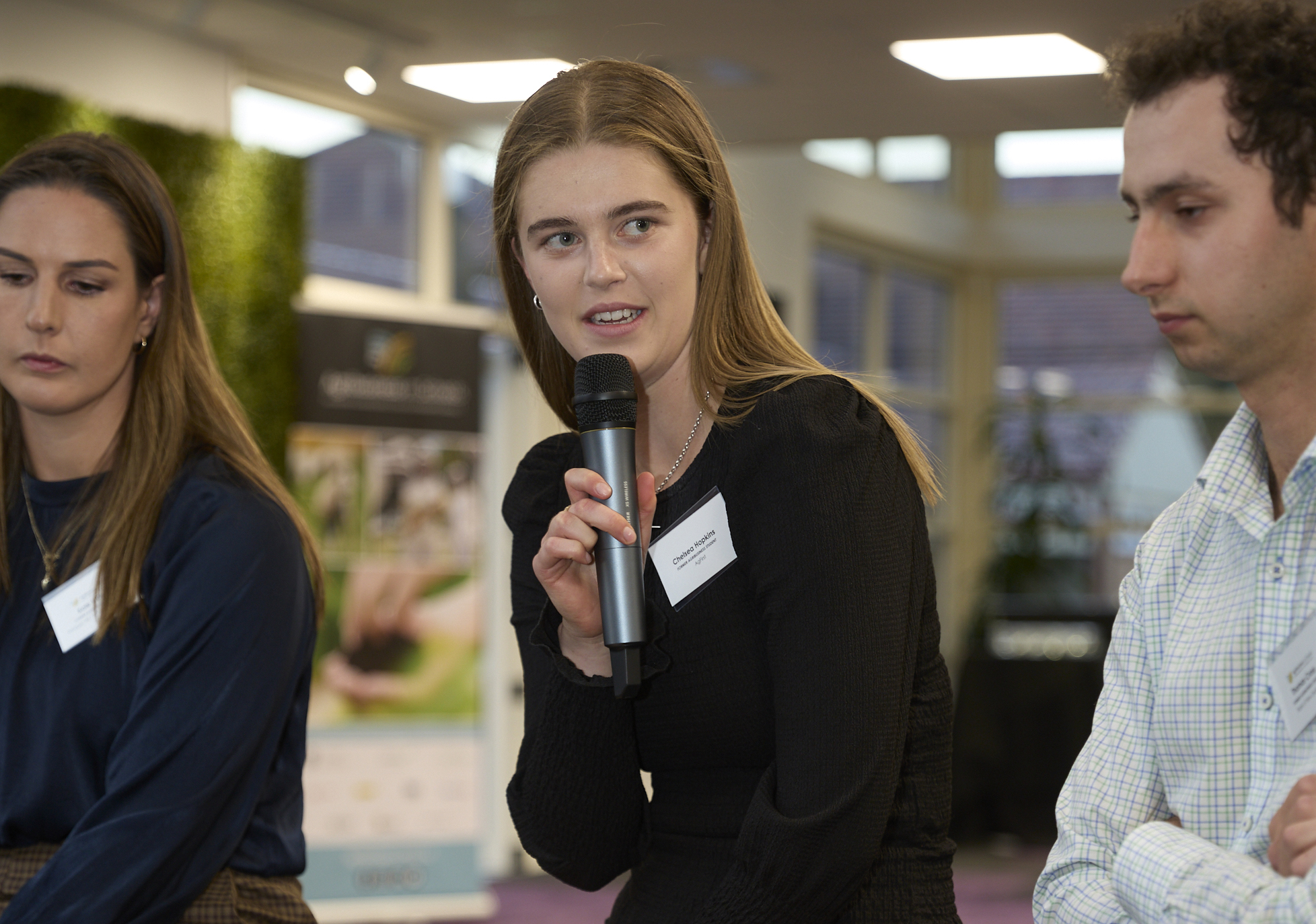
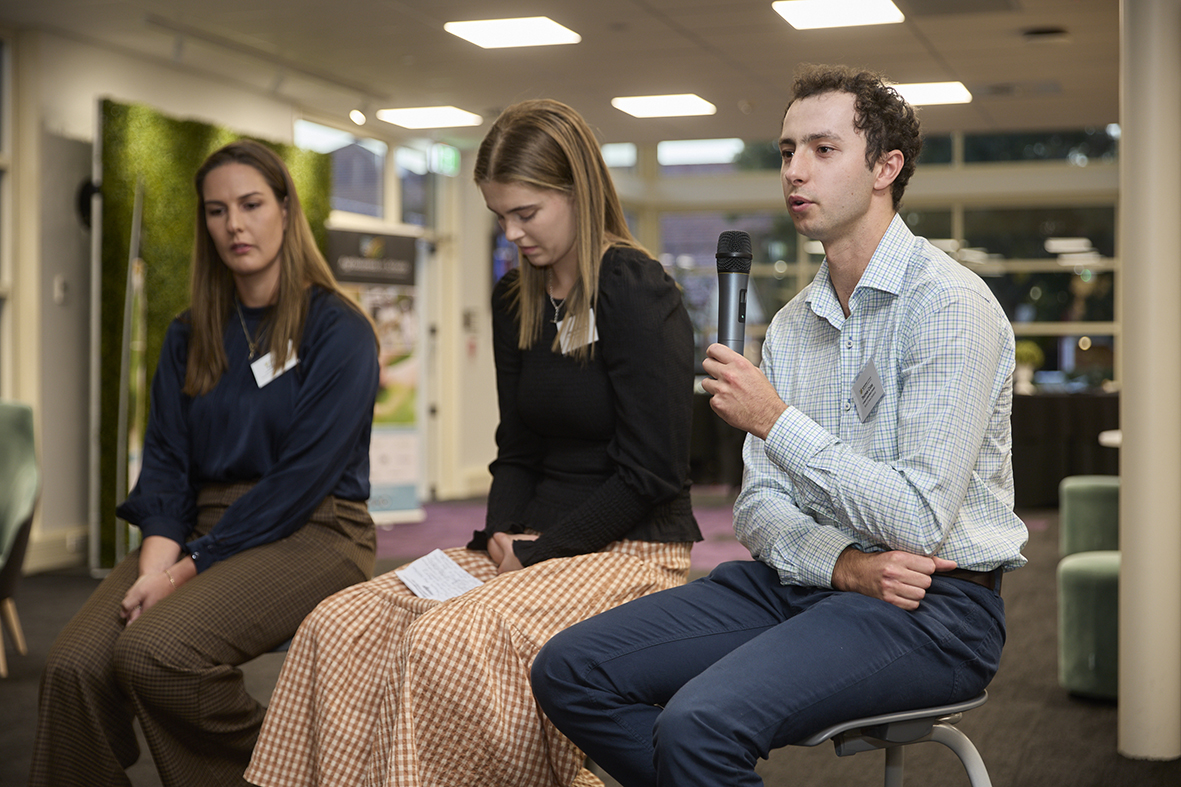
Providing a pathway for youth to gain meaningful and enjoyable careers
Thomas Cross has been involved in agriculture his whole life. He grew up on a sheep and beef farm located on the Otago Peninsula where his family has been farming for seven generations. Thomas has always been interested in the practical side of farming, however whilst attending John McGlashan College became more focused on the theoretical side. This was further encouraged by John McGlashan offering Agriculture as a subject in Year 10 and 11 and then Agribusiness in Year 12.
The opportunity to take Agribusiness as a subject was a great opportunity for Thomas as it combined Agriculture with other subjects he was also interested in such as Science and Accounting. He enjoyed the subject content a lot and found the learning very relatable to working on his own family farm.
Through taking both Agricultural and Horticultural Science and Agribusiness, Thomas then decided to pursue a Bachelor of Commerce majoring in Agriculture and Professional Accounting at Lincoln University from 2019 to 2022, which he also thoroughly enjoyed. Thomas accredits the Agribusiness in Schools programme to being a great stepping stone to this.
Studying at Lincoln gave Thomas many opportunities to work on a wide range of farms in various areas of New Zealand and make valuable industry connections. In his final year of study, Thomas decided that he wanted to pursue a career in rural banking. Rural banking interested Thomas as it related to his studies and would provide further engagement with the farming community.
In 2022, Thomas was lucky enough to gain a role with BNZ as an Agribusiness Graduate based out of Timaru. He has now been in this role for 5 months and sees a real future for himself in the industry. "In this role I have found Agribusiness in Schools, and my university studies, very beneficial and helpful. Both the knowledge and relationship building skills obtained have led me to the position I am in today."
Thomas along with Chelsea Hopkins and Kate Wilkins, were guest panellists at the Agribusiness in Schools Ten Year celebration, 29th March 2023. They were each asked to come up with a slogan that would entice young people into working in the Agribusiness sector.
Chelsea Hopkins :
- “No two days are the same, help us navigate change”
- “Farming is not a job it’s a way of life and there’s something for everyone”
Thomas Cross:
- “Take all opportunities you get, you never know where you might end up”
Kate Wilkins
- “Agribusiness - More than meets the eye. A vast range of jobs are available from working on the land, to working in a lab.”
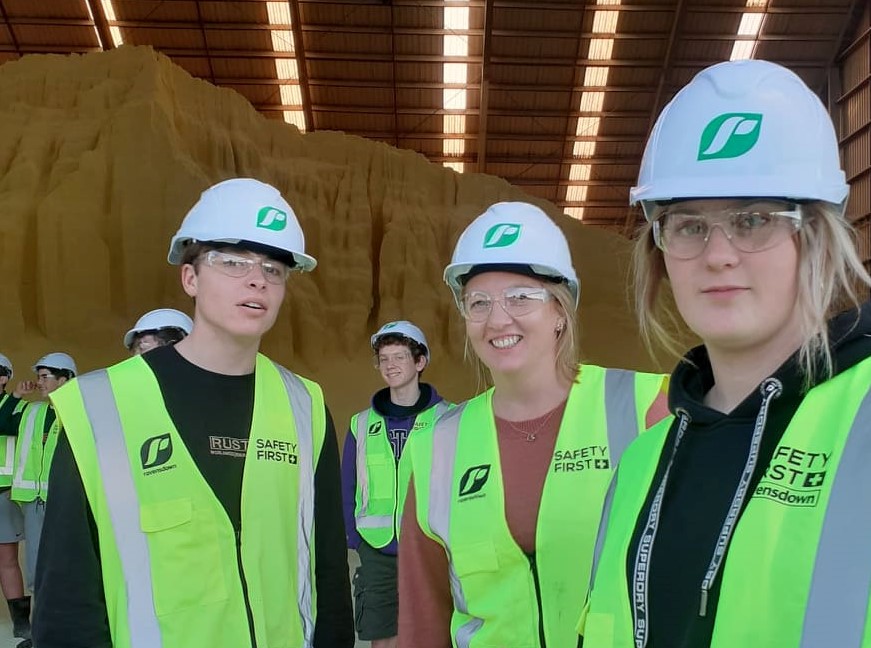
A background working in the Primary Industries and now highly successful teaching career, Coadette Low loves her job!
Coadette Low lives and breathes the Ag industry. She has an unwavering passion and a fist full of knowledge that she is now dutifully passing on to the youth of our nation, through agribusiness education. Agriculture, Horticulture, and Agribusiness she has done it all, from working across the ditch and teaching in Australia for 4 years, and currently in her 8th year of a highly successful teaching career here in New Zealand, she certainly has the accolades to prove it.
- Teach NZ Secondary Teachers’ Study Support Grant (2021)
- Finalist in the Primary Industry Awards NZ – Emerging Leader category (2021)
- Teach NZ Secondary Teachers’ Study Award (2022)
- University of Waikato Research Masters Scholarship (2022)
- Finalist in the Beef+LambNZ Awards – People Development category (2022)
You also might be mistaken for thinking that Coadette was from a farm, but no, Coadette was an urban gal and grew up in Napier, attending Taradale High School. She did however love animals and at one stage wanted to be a vet, but after a work placement during her school years, realised that it wasn’t the correct pathway for her. Not adverse to hard work, in Year 11, through a family contact, “Brendan Mahony Shearing”, she nabbed a job in the shearing sheds as a wool handler, working in the weekends and every school holidays. In Year 12 however, she still didn’t know what she wanted to do and almost left school to go and work full-time. To this day she is grateful to her mother for convincing her to stay and finish Year 13.
One of the farms that she worked on as a wool handler was a sheep stud, north of Napier near Tutira. After her chats to the farmer about his genetics programme, this sparked an interest in the genetics field and Coadette went on to study a Bachelor of Science – Majoring in Animal Science and Physiology, at Massey University. She was lucky enough after her degree to secure a job with Thomas Foods International abattoir in South Australia.
“They flew me out the day after my last exam. They paid for everything, and I knew that if I didn’t take the opportunity to head overseas and work after uni, I probably never would’ve done it”. After five years working in the abattoir, in Quality Assurance, her role varied from microbiology, carcass grading, support on both slaughter floors and boning rooms (sheep + cattle), quality audits, traceability and complaint procedures. Knowledge wise, by this stage Coadette was more than qualified to start teaching. She remembers a past Biology teacher at high school recommending that she should be a teacher, and it was only after working in the abattoir that she considered it.
Coadette completed her Graduate Diploma of Secondary School Teaching at the University of Adelaide in South Australia and taught in Australia for 4 years before the heart strings started to pull for home. In 2016, a high school friend who was teaching at Wairarapa College at the time sent her a job advert for Head of Agriculture at Rathkeale College in Masterton. She applied that weekend and the rest is history!
In 2018, Coadette implemented the Agribusiness in Schools course, after hearing about it at a HATA conference and through Melanie Simmons, the Agribusiness in Schools Advisor. With the support from the community and students, she was keen to take it on. At the start of 2023, Coadette took on the new role, as Head of Department Agriculture at Mount Albert Grammar School in Auckland and TiC of their Agribusiness in Schools programme.
Coadette’s passion for teaching mostly comes from the students who take it and the relational aspect, both theoretical and practical. She also of course loves the subject content, as the information is forever evolving, and she is always continuing to learn. Coadette states that the most popular careers that students tend to go into after completing an Agribusiness related degree are; Marketing, Consultancy, Rural Banking or Logistics. However, their first “taste “ literally is the Agribusiness in Schools programme, where student assessments include practicals on harvest to product. The students can make Camembert cheese, honey and biltong. It is a subject that focuses on beyond the farm gate, but also the entire value chain, where students look at aspects from innovation, technology, value adding, financial decisions, external factors of influence and is a subject that encourages critical, analytical thinking and problem-solving.
Coadette believe that all schools should teach Agribusiness alongside the Agricultural and Horticultural Sciences. ‘‘Any teacher who has an interest in food and money would excel at teaching the course, the only challenge is finding those teachers.’’ The other challenge is schools understanding the importance of offering the subject to the young people of New Zealand and the flow on effects that it will have, not only as they go into their career pathways after secondary schooling, but also into becoming conscious consumers, aware of sustainable practices, what mitigations are already in place, how they work, and what future research is being engaged with.
Coadette goes on to say, “it is our duty to ensure that we educate the youth of New Zealand about the Primary Industries here in New Zealand, and how important it is to our own economy’’. All New Zealanders need to be aware of their own impact on the environment, which includes reflection of their footprint, purchasing habits and understanding where their food comes from.
2022 Agribusiness and past St Paul's Collegiate School student, Maia Kelly reflects on her time learning the subject.
Maia applied for and won the “Hiranga” Scholarship to attend the University of Canterbury and went on to study Law and Commerce, (majoring in Economics).This combination, she felt would well prepare her for a range of future career aspirations, including within the agribusiness sector.
Maia was first attracted to the course as an option through her interest in Economics. Not knowing anything about the Primary Industries, being a “townie” without a farming background and picking up the subject late in Year 13, she definitely had a few hesitations, however none of these factors seemed to inhibit her at all. Maia described studying the Agribusiness in Schools subject as highly interesting and a real “eye opener” into how important the Primary Industries are, to the economic survival of New Zealand.
With job opportunities extending well beyond the farm gate, such as food technology, aquaculture, equine, and forestry - just to name a few, Maia found this is an exciting aspect of the curriculum.The Agribusiness in Schools programme has four main areas of learning;
- Agri-science
- Agri-marketing
- Agri-management
- Agri-Innovation
At St Paul’s Collegiate School in Hamilton, Agribusiness has its own dedicated Gallagher Centre of Excellence building that consists of two classrooms and a kitchen, where students can experiment with making food products. One of Maia’s internal assessments was learning how to make Camembert cheese. With the focus on innovation, a probiotic was added to the cheese to increase its market value. Maia recalls learning about this, and laughs about the fact that she didn’t have any idea of how Camembert cheese was made! “It ended up like a hard goo that was covered in liquid and then we had to cut it” Another practical assessment she really enjoyed was learning how to make biltong.
During her studies, she went on to develop a special interest in environmental issues. Maia said that taking Agribusiness, greatly increased her awareness of current affairs and topics she was learning about at school, were appearing on the news! One such topic was the negative effects of nitrogen leaching into the waterways of New Zealand. In Maia’s Economics class at the time, they had also been learning about “negative externalities in production” and found the cross over of subject matter, very complimentary and added a different lens as well as depth and breadth to her learning in both subjects.
One of Maia’s most memorable learning experiences from the programme was “The Crocodile Pit”, where a panel of 6 expert judges, rated the marketability of the students Agribusiness related product or service they had invented. There was the possibility of winning $400 cash for your group and the opportunity to showcase your product at the New Zealand National Fieldays Innovation Hub in 2022. This was her very first assignment and admits she was “slightly terrified” at the time, but saw it as such a great learning experience on how to market a product successfully in the real world.
In 2022, COVID-19 put a halt on things like fieldtrips and guest speakers, which are usually a main feature of the Agribusiness in Schools curriculum. Unfortunately, traditionally Agricultural and Horticultural Science subjects in education have been seen as non academic subjects, however Maia believes that the Agribusiness in Schools programme would be beneficial and interesting to anyone with a strong work ethic.
She goes on to say that ‘‘you don’t necessarily have to excel at math or science, although this would definitely help, as there is a lot of practical learning, researching, gaining knowledge and then analysing those findings to come up with multiple solutions to a problem Maia loved the problem solving side of the Agribusiness in Schools programme and learning about the inner workings of a business.
"The Primary Industries are always thinking about opportunities for future growth and expansion, focusing on problems and how they can be improved, and I like this about the industry."
Simple solutions for best outcomes
Written by Mark DanielDesigned as a holster for needle-based vaccination guns, the plastic moulded device incorporates an integral reservoir to house a disinfectant solution to sterilise the injection needle each time the gun is replaced in the holster. This helps ensure that vaccinating a large mob is quicker, easier and safer, while removing the risk of disease transfer and the need to constantly change needles.
The clever duo came up with the idea when Ben’s grandfather, Linden Hunt, raised the issue of the tedious task of constantly changing needles or finding a way to disinfect them while velveting. Looking at the problem more closely, the team soon found there didn’t appear to a solution to sterilising needles in the marketplace. This led to collaboration with Hamilton-based DEA Plastics, who already operated in this field.
Suitable for all types of farming operations and for veterinarians, Sterineedle incorporates an integral clip for belt mounting, but could just as easily be mounted to a race or cattle crush for convenience. For more info, contact k.allen@stpauls.school.nz.
To read the full article go to the article at the Diary News

